










































I n the previous two columns, we explored two questions: (1) Is there a leader? and (2) Is there a vision? This third installment connects passion to both leadership and vision. If you aren’t passionate about your vision, you don’t have a vision. Passion is what validates your investment into your vision. Passion is why God inspired John to put the word “so” in front of “loved” in John 3:16. Passion is what caused the Father to see the prodigal son while he was still a long way off and run to his son. Passion is what holds your commitment to something when logic and reason fail you. Passion is preoccupying. Your mind is running constantly back to it. It takes an effort to think about something else. Passion is personal. It attaches itself to your own identity and it becomes self-defining. Passion is emotional; it’s hard to talk about it without inflection in your voice or getting caught in hyperbole. Passion is powerful. Like a ship going through the water, it creates a wake that people get caught up in. When a vision is doused with passion, you’re getting pretty close to all you need for a roaring fire.
A church service should be filled with passion. I’ve often asked, “How can someone be in the presence of God and stay the same?” And yet, there are plenty of people that don’t change at all. Maybe there is unresolved sin, divided attention, or a closed-off heart blocking his presence. But maybe it’s the fault of those of us who call ourselves leaders. Maybe we’ve lost our passion.
Ephesus was a passionate church in the midst of a passionate people. The picture of the church’s elders weeping over Paul in Acts 20 is riveting. If you could choose a New Testament church to be a member of, it would be hard to beat Ephesus. They were doing it right. It’s revealed so brilliantly in Paul’s letter to them. Paul stayed there two years, longer there as a pastor than anywhere else. Later, John used Ephesus as a base of operations for managing all the churches of Asia Minor. Jesus’ mother lived there. The church became a critical metropolitan hub for infant Christianity. The church was approaching 50 years old
at the end of the first century. She still looked great from the outside as she obediently went through the motions, but something essential was missing. According to Revelation 2:4-6 she’s lost her first love— her passion. Jesus was making it clear that there really was no point in existing without it.
What a perfect picture of so many churches in the communities where we serve. Still healthy, somewhat effective, and obedient to a fault, many churches have lost the passionate vision they once had. Vision has been replaced by tradition, and passion by obedient maintenance. To illustrate this point, I planned a sermon to be interrupted by dimming lights, soft music, a disco ball, and a couple in a tux and formal gown dancing to “The Very Thought of You.” I acted as if I’d been interrupted and told them to sit down. Lost in each other’s eyes, they completely ignored me. As I complained, a church member yelled at me to sit down! When the song was over, they strolled away holding hands and continuing their gaze. I returned to the sermon saying that the love that Jesus wants is captivating, preoccupying, and passionate. Passion rekindles the flame in our hearts for Jesus and his mission. Like the Ephesian church, our vision is pointless without passion.
Excerpted from Micropolitan Church
@_jerryharris /jerrydharris

About seven years ago, I learned that the weekly lesson material written for The Lookout would require a new scope and sequence, a strategy through which we would approach Bible study. In addition, I learned that the scope and sequence we had been using was overseen by the National Council of Churches, an organization that is not known for an accurate interpretation of Scripture. This led me to a process of creating our own scope and sequence, and with that, a complete six-year study through the entirety of God’s Word with material written by Dr. David Faust and Dr. Mark Scott.
Now, six years later, and having completed this massive undertaking, Christian Standard Media is offering something new and exciting to our readers. We’ve named this new series 1717 Studies: Your Word Is Truth. The name comes from Jesus’ words in John 17:17. All of our biblical studies written over these last six years are being compiled into fully downloadable files from each Bible book with applications and study questions for your small group, Sunday school class, discipleship group, and for personal study and reflection.
While this has cost us over $100,000 to produce, we are offering it to you at no charge, asking only that you might consider a tax-deductible contribution to Christian Standard Media. We will be releasing each book or group of books in the coming months.
Take a journey through the Bible with two of the most renowned and trusted scholars in our movement and discover what truths God will reveal to you as you spend time immersed in his Word! 1717 Studies: Your Word is Truth is available online at Christianstandard.com.

ERRETT
Devoted to the restoration of New Testament Christianity, its doctrine, its ordinances, and its fruits.
team
Jerry Harris, Publisher
Shawn McMullen, Editor
Rick Cherok, Managing Editor
Abby Wittler, Designer
Renee Little, Operations
Allison Harris, Marketing + Advertising
Christine Reiner, Customer Service

Subscription Information
To order Christian Standard for yourself, your church, or your group, visit christianstandard.com or contact Customer Service. Bulk pricing is available.
CUSTOMER SERVICE
720.598.7377
info@christianstandardmedia.com
Volume CLX. Number 3 Christian Standard (ISSN 0009-5656) is published every other month by Christian Standard Media at 16965 Pine Lane, Suite 202, Parker, CO 80134. Periodicals postage paid at Parker, CO, and additional offices.
All Scripture quotations, unless otherwise indicated, are taken from the HOLY BIBLE, NEW INTERNATIONAL VERSION NIV®. Copyright ©1973, 1978, 1984, 2011 by Biblica, Inc. Used by permission of Zondervan. All rights reserved.
POSTMASTER: Send address changes to Christian Standard Media, 16965 Pine Lane, Suite 202, Parker, CO 80134. Phone: 1-720-598-7377.
SUBSCRIBERS: Send address changes to Christian Standard, 16965 Pine Lane, Suite 202, Parker, CO 80134. Send old and new addresses, complete with zip codes, at least six weeks before delivery date.
ChristianStandardis published by Christian Standard Media, www.christianstandardmedia.com.
Email: cs@christianstandardmedia.com Website: www.christianstandard.com
Copyright ©2025 by Christian Standard Media
Printed in USA
Dr. Mark Scott

Jack Cottrell
Greg Pruett
Ricky Altmiller
SPIRITUAL WARFARE & MENTAL HEALTH: A CHRISTIAN COUNSELOR’S PERSPECTIVE
Doug Spears, Ph.D., LPCC/s
Ginny McCabe
Christopher
David Roadcup
ENGAGE
Tyler McKenzie 16-18
Should Christians join the backlash against D.E.I.?
Community Change Brings Life Transformation
Laura McKillip Wood HORIZONS
The Parent’s Post: Stewarding Adult Children with Grace, Grit, and Snacks Rudy & Oshayre Hagood INTENTIONAL 26-28
PREACH
Chris Philbeck 32-33
Preaching with Your Own Voice
METRICS
Kent E. Fillinger 36-38
Beyond the Budget: Navigating Church Giving and Finances

Military history is rife with accounts of armies who were decisively conquered by their opponents, yet even in defeat, continued to resist by waging guerilla warfare. Fueled by an unwillingness to accept loss and an intense hatred for the enemy, pockets of these conquered armies continued to resist long after their defeat, hoping to inflict as much damage as possible for as long as they were able.
This aspect of combat history also describes the purpose and work of Satan in the world today. From the moment he set himself up against God and was cast out of heaven, the devil has been hard at work, relentlessly attempting to disrupt and impede the plan of God.
He’s a formidable adversary. Known as “the tempter” (Matthew 4:3), “a liar and the father of lies” (John 8:44), “the evil one” (Ephesians 6:16), “your enemy” (1 Peter 5:8), the one who “leads the whole world astray” (Revelation 12:9), and “the accuser” (12:10), Satan isn’t compelled to fight by the rules. He’s devious, persistent, and ruthless. His millennia of experience give
him keen insight into human nature and make him a master of deception.
Although Jesus’ resurrection dealt him a crushing blow from which he can never recover, Satan continues to lead his demonic army in attempts to corrupt and destroy God’s faithful.
From Saul to Paul Guerilla campaigns aren’t without their turncoats, however. Consider Saul of Tarsus. Operating from a misguided devotion to God, Saul ruthlessly persecuted the church of Jesus Christ. Acts 8:3 tells us how “Saul began to destroy the church. Going from house to house, he dragged off both men and women and put them in prison” (New International Version).
But something happened that changed Saul’s allegiance. As he traveled to the city of Damascus to expand
the reach of his persecutions, Saul was confronted by Jesus Christ himself. That confrontation led to Saul’s conversion (see Acts 9:1-22), and eventually to his commission as a high-ranking leader in the army he once fought against. As Paul the apostle, he devoted the rest of his life to serving his new commander, Christ, and working tirelessly against the devil’s schemes.
Even wicked armies have their codes and despise their defectors, and to Satan, Saul of Tarsus was a traitor. Throughout his ministry, Paul the apostle endured the wrath of his former master. Satan directly interfered with Paul’s ministry plans. He wrote to the church in Thessalonica, “For we wanted to come to you—certainly I, Paul, did, again and again—but Satan blocked our way” (1 Thessalonians 2:18). And he didn’t stop there. It seems the deceiver took Paul’s defection personally and responded with personal payback. “I was given a thorn in my flesh, a messenger of Satan, to torment me” (2 Corinthians 12:7).
Paul knew what he was up against. He understood that he had angered the enemy, as does every lost soul who becomes a child of God. It was from that context that he wrote, “Put on the full armor of God, so that you can take your stand against the devil’s schemes” (Ephesians 6:11), adding, “For our struggle is not against flesh and blood, but against the rulers, against the authorities, against the powers of this dark world, and against the spiritual forces of evil in the heavenly realms” (v. 12).
Paul had many enemies in this world. Real human beings who did all they could to make his life and ministry difficult. But he always knew that below the surface, the real enemy, the force behind all the opposition, operated in the spiritual realm.
The True Battlefield
You have to give the devil credit for implementing such an ingenious plan. As he draws nearer and nearer to Judgment Day, intent on corrupting as many of God’s children as he can, he’s devised a scheme to make it appear as if we’re struggling with people and
circumstances we can see, when all the while we’re doing battle directly with him in the spiritual realm.
Anytime we choose sin over holiness; whenever we fight with family, quarrel with a coworker, undermine a fellow church member, or violate our own conscience, Satan wants us to see only one dimension of the struggle. He doesn’t want us to realize that as we face conflict in the physical realm, we are also at war in the spiritual realm.
As long as we’re unaware that a spiritual battle rages behind every temptation we face, Satan’s forces have the upper hand in the struggle. Like guerilla soldiers, they remain out of sight, attacking from behind cover.
Paul sought to change that perspective among God’s people by writing, “Therefore put on the full armor of God, so that when the day of evil comes, you may be able to stand your ground, and after you have done everything, to stand” (Ephesians 6:14). The explanation that follows shows us how the pursuit of truth, righteousness, peace, and faith combined with confidence in our salvation, a commitment to God’s Word, and the practice of prayer empower us to stand our ground against the enemy’s assaults.
Once we’ve opened our eyes to Satan’s tactics and are protected by God’s armor, nothing can take us by surprise. Even so, like Paul, we must remember that we’ve made an enemy for life. As long as we remain in this world, Satan will pull out all the stops to pry us from our faith. Let’s counter his efforts, not by focusing exclusively on resistance, but by drawing nearer and nearer to the God we love and serve.

@shawn.a.mcmullen
/shawn.a.mcmullen

Fly a kite on a completely windless day. You’ll run back and forth, sweating and frustrated, dragging lifeless fabric behind you. Eventually you’ll come to the inescapable conclusion: We need wind. That’s where many churches find themselves today—exhausted from activity, implementing the latest strategies, yet sensing something essential is missing. That something is the wind of the Holy Spirit.


The American church has never been more resourced. We’ve built bigger buildings, increased budgets, and embraced powerful communication tools. Yet too often engagement is shrinking, influence is waning, and spiritual impact is thinning. The disconnect should prompt some hard questions.
In our corporate culture it’s easy to assume the challenge is strategic, but what if it’s spiritual?
To be clear, I’m not saying those things are mutually exclusive, but what if we’ve become impressively efficient at church operation while increasingly deficient in dependence on the Spirit? Is it possible we’ve pursued a mastery of ministry mechanics but missed the miraculous. The early church didn’t grow through savvy systems, but supernatural strength. Their secret wasn’t better planning—it was deeper prayer and desperate reliance.
Church leaders today face immense pressure to produce measurable results. This pressure naturally drives us toward what we can control—better production, clearer communication, stronger leadership systems. These are good things, but they can quietly become cheap substitutes for what we cannot control but most desperately need—the supernatural presence and power of the Holy Spirit.
In Acts, we see a church that had none of today’s ministry advantages—no buildings, budgets, or broadcast platforms. What they had was the manifest power of God.
They grew because they caught the wind.
Today, many pastors feel depleted. We’ve tried everything—fresh programs, compelling vision, improved leadership—and yet the burden remains. Into our exhaustion, Jesus whispers the same invitation: “Come to me, all who labor and are heavy laden, and I will give you rest.”
This rest isn’t passive but receptive. It’s a posture that trades self-reliance for Spirit-dependance. It’s the difference between building something for God and allowing God to build something through us.
The cultural challenges facing today’s church are significant.
In this post-pandemic world, attendance patterns have shifted, volunteering has declined, and spiritual rhythms have eroded. Strategies that once worked before often fall flat—not because they they’re poorly executed, but perhaps because they lack the spiritual vitality only the Holy Spirit can provide.
Throughout Scripture, moments of disruption often precede movements of renewal. The early church was born in the wake of the ultimate disruption—the crucifixion of Jesus—followed by his unexpected departure. Into that confusion came Pentecost, with its wind and fire.
We’re not just facing cultural change; we’re navigating a digital deluge. Our congregations have instant access to the world’s best preachers, worship teams, and Bible teachers online. Yet in the midst of all this content, let’s recognize that real spiritual growth is not primarily informational; it’s relational and supernatural. The Holy Spirit doesn’t just inform, he transforms. He doesn’t merely educate, he empowers. In a time when churches can primarily become content creators and consumers, we must reawaken to the irreplaceable work of the Spirit.
Add to that rising polarization, fragmented attention spans, and growing skepticism of institutional religion—and we’re facing headwinds no program can overcome. These are not problems we can solve with better branding. They require a fresh move of God.
Human effort can never produce what only the Holy Spirit can.
Here’s the beautiful paradox: greater spiritual impact begins by admitting our lack of power.
When we confess that our strategies aren’t enough, we create space for the sufficiency of the Spirit.
I’m reminded of Peter and John at the temple gate. They had no money to offer, no worldly leverage, but they had something better: “In the name of Jesus Christ of Nazareth, rise up and walk” (Acts 3:6).
Today’s church may or may not have plenty of silver and gold, but what we need is the kind of bold, Spirit-dependent power that comes only from beyond ourselves.
As we step forward in this pivotal cultural moment, our greatest need isn’t newer models. It’s deeper surrender. We don’t need to try harder; we need to yield more fully to the Spirit’s leadership. We need more than an effective plan. We need his presence.
All of this is exactly what we’ll be focusing on at this year’s Spire Conference hosted at Southeast Christian Church in Louisville, Kentucky on September 23-25. It’s a timely and essential gathering for church leaders.
The wind of the Spirit is still blowing.
Let’s catch it together.


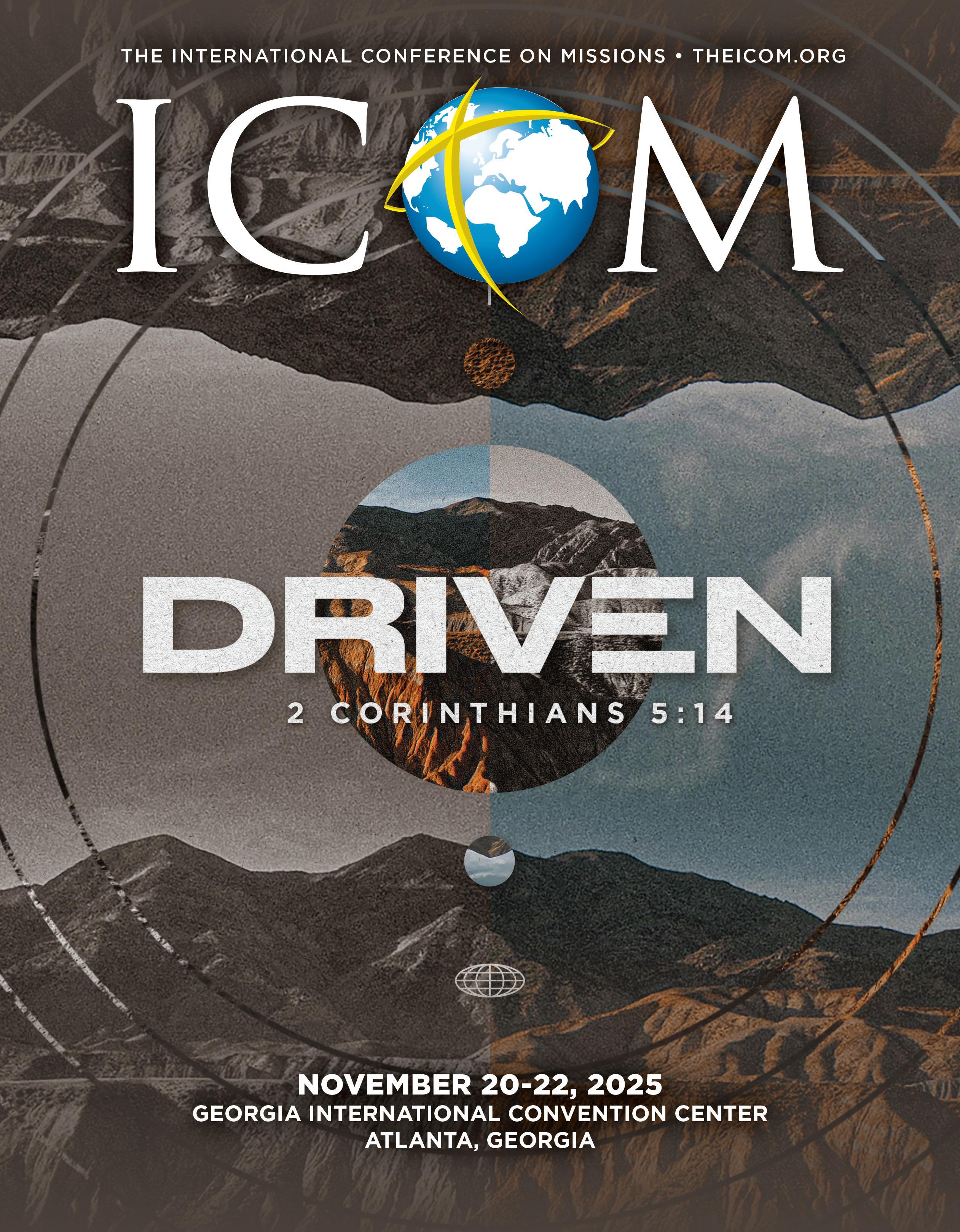



e 2:effective elders
There is a battle raging! The fight is all around us, a fight that influences each of us as leaders in the church. The enemy is real, powerful, and focused. The enemy is Satan, the liar and father of lies, the deceiver, the hater of all things holy, righteous, and just. As leaders, we must be aware of his goals and of what Scripture says we must do to protect ourselves and our churches from his onslaught.
Satan knows that every soldier has great potential to do damage to his kingdom of darkness. He will stop at nothing to take us down. John Eldredge wrote, “The story of your life is the story of the long and brutal assault on your heart by the one who knows what you could be and fears it."
In Ephesians 6:10-20, Paul provides a detailed explanation of who Satan is and how we can defend ourselves from his attacks.
By David Roadcup
The Enemy We Face
Paul lists several characteristics of Satan in Ephesians 6.
The enemy is real (6:11). “Put on the full armor of God, so that you will be able to stand firm against the schemes of the devil” (New American Standard Bible, 1995). The presence of Satan (evil) is a reality in our daily existence. We know he is present and real from seeing him tempt Jesus in the wilderness (Matthew 4:1-11), to arguing with the archangel, Michael, over the body of Moses (Jude 9), to experiencing our own personal spiritual struggles.
The enemy is unseen (6:12). “For our struggle is not against flesh and blood.” Paul explains that we cannot fight against this enemy with mortars, guns, and tanks. It is not a physical battle but one that takes place on battlegrounds in the spiritual realms.
The enemy is powerful (6:12). “But against the rulers, against the powers, against the world forces of this darkness, against the spiritual forces of wickedness in the heavenly places.” Interestingly, Paul uses words and phrases that indicate cosmic powers and authorities. These all generally point to ultimate world control which was and is Satan’s final goal.
The Praetorian Guard, mentioned by Paul in Philippians 1:13, was an elite military branch of the Roman Empire. The main purpose of the Praetorian Guard was to protect Roman emperors. We know that Paul was under house arrest when he wrote the book of Philippians. He
would have been guarded 24/7 by a member of this elite group. Paul had apparently been successful in leading some of the soldiers in the Praetorian Guard to Christ. Since Paul saw soldiers daily, commentators believe Paul simply took the individual pieces of the armor they wore and applied them to how we should protect ourselves.
Paul lists the items of the soldier’s armor in the order in which they were put on. Together they compromise the panoplia, or the complete set of armor worn before taking the field. In Ephesians 6:13-17, Paul wrote,
Therefore, take up the full armor of God, so that you will be able to resist in the evil day, and having done everything, to stand firm. Stand firm therefore, having girded your loins with truth, and having put on the breastplate of righteousness, and having shod your feet with the preparation of the gospel of peace; in addition to all, taking up the shield of faith with which you will be able to extinguish all the flaming arrows of the evil one. And take the helmet of salvation, and the sword of the Spirit, which is the word of God.
The Belt of Truth. The belt was a critical component of the soldier’s armor. The soldier would secure his belt tightly when going into battle. It held many of the pieces of armament together. Truth for the believer is the key in establishing our faith.
The Breastplate of Righteousness. The breastplate covered the body from the shoulders to the thighs. Polybius tells us that it was known as the heart protector. It also protected the lungs and other viscera of the body. Our personal righteousness is a powerful protector of our lives. Righteous living is simply a protection from the payback of sin in one’s life.
Our Feet Shod With the Preparation of the Gospel of Peace. The soldier’s boots (caligae) were shoes thickly studded with sharp nails so as to assure a good grip. Commentators are mixed about the application of this piece of armor, but it would appear that the believer is to be prepared to hold their ground and be adequately prepared to share their faith when the opportunity presents itself.
The Shield of Faith. The Greek word for "shield" is also the word for "door" The shield was a large oblong or oval shape made of two layers of wood covered with linen and hide and bound together with iron. The shield protected the warrior from the flaming arrows of the enemy. When Satan has unleashed his projectiles at us with all of their fury, our faith will protect us from his intense attack.
The Helmet of Salvation. The metal helmet was used to protect the head and the brain. Our salvation is given to us as a definite form of protection. Through our confidence in our salvation, we know we are secure in Jesus.
The Sword of the Spirit. The sword is the only offensive piece of armor. This short-handled sword ( gladius) was a powerful weapon in battle. Our confidence in the Word of God as our weapon of war wields power and impact in our spiritual battle.
The energy we need in our battle comes through prayer. Paul wrote,
With all prayer and petition pray at all times in the Spirit, and with this in view, be on the alert with all perseverance and petition for all the saints, and pray on my behalf, that utterance may be given to me in the opening of my mouth, to make known with boldness the mystery of the gospel, for which I am an ambassador in chains; that in proclaiming it I may speak boldly, as I ought to speak.
Soldiers and armies need power in various forms. When we pray, the power of God provides spiritual victory. Prayer is the key. We pray personally, we pray as a leadership team, and we pray as a congregation to be victorious when it comes to the battle. Samuel Chadwick wrote, “Satan dreads nothing but prayer. He fears nothing from prayerless studies, prayerless work, and prayerless religion. He laughs at our toil, mocks at our wisdom, but trembles when we pray.”
As leaders in the church, when experiencing intense spiritual warfare, our best defense is to follow the instruction from Paul and internalize his exhortation to stand firm, use the equipment God has given us, empower ourselves and our churches in prayer, and experience the victory that comes as believers in Jesus.
Elders, pray and lead well.
about the author

Should Christians join the backlash against D.E.I.?
By Tyler McKenzie
On January 7th, 2025, flashing a $900,000 watch, the new-look CEO of Meta, Mark Zuckerberg, released a six-and-a-half-minute video detailing significant changes to Facebook and Instagram’s content moderation policies. He basically admitted they had been censoring the free expression of their users. He promised to correct these mistakes by: (1) replacing third-party fact-checking, (2) lifting restrictions on topics previously censored like immigration and gender identity, and (3) moving their trust and safety teams from California to Texas. Then on January 10th, Meta announced it would be eliminating their DEI division, canceling their equity and inclusion programs, and reassigning their Chief Diversity Officer.
In 2020, the murder of George Floyd took place about 10 minutes from Target’s headquarters. In response, their leadership pledged substantial efforts to advance racial equality. This was in addition to Target’s participation in LGBTQ advocacy. In 2023, CEO Brian Cornell praised these new DEI efforts for fueling sales and improving employee engagement. Then on January 24th, 2025, less than two years later, Target announced that they would be walking back their DEI commitments and partnerships. Quite the 180-degree turn.
While Meta and Target have made a lot of noise, many others in corporate America have followed suit. Walmart, John Deere, and McDonald’s all made public announcements they will be retreating from DEI policies. This New York Times article details how companies like Live Nation, Adobe, Johnson & Johnson, and Uber have changed their internal language. This article names public universities like UNC-Chapel Hill and Colorado who are changing their curricular requirements or scrubbing their websites in response to President Trump’s new executive orders. Noteworthy is the NCAA’s decision to comply with Trump’s ban of biological men from women’s sports, a reversal on their previous stance.
On Trump’s first day in office, he issued Executive Order 14151 “Ending Radical and Wasteful Government DEI Programs and Preferencing.” This was in response to heavy-handed efforts by the Biden administration to bake DEI into America’s most important institutions. Some suggest the sweeping language in this order is what has struck fear in so many. Others say the backlash against DEI captured momentum back on June 29th, 2023, when the U.S. Supreme Court struck down affirmative action in college admissions.
I could go on with the examples, but you get the point. DEI seems to have suddenly lost its shine. The social benefits are evaporating. The structures of public support have flipped. It is important to note that some companies like Goldman Sachs and Costco have held their ground, but these examples feel few and far between.
In a word? Overreach. I was recently in a conversation with a Christian mentor who is outspoken about his political progressivism. We have worked together the past few years to advocate for diversity and boundarycrossing love in my church. However, he lamented the fact his child had to leave their job at a Fortune 500 company because they believed they would never get another promotion based on company DEI goals.
At some point, there was a failure by many to distinguish between common sense and radical ideologies. It’s one thing to help disadvantaged groups get a seat at the table. It’s another thing to allow biological men to win championships in women’s sports. It’s one thing to invest in the next generation of Black leaders and businesses after our sordid history of discrimination. It’s another thing to set admissions quotas that privilege one racial group at the expense of another. It’s one thing to do payroll analysis to ensure men and women are getting paid fairly for doing the same jobs. It’s another thing to advocate for DEI accommodations in the military that put lives at risk. It’s one thing to police hate speech, discipline bullies, and encourage majority groups to listen to minority experiences. It’s another thing to enforce speech codes that unnecessarily shame or silence well-meaning members of these majority groups.
“Straight, cisgender, white, Christian men are not allowed to speak about this!” I have heard this sentiment more than once. The idea is that your lived experience either empowers you with authority if you are part of a marginalized group or disqualifies you from authority if you aren’t. It’s the principle of intersectionality. Those who stand at more intersections of marginalization have more authority to speak. Encouraging the privileged majority to listen has led to a lot of good, but many people have seen it go too far. An ad hominem fallacy occurs when someone rejects or criticizes another’s point of view based on nonrelevant personal characteristics rather than on the merits of their argument. The more logical fallacies deployed in a debate, the quicker the debate devolves into frustration.
The problem is that as the pendulum swings away from the left back toward common sense, it seems like many on the right are determined to make the same mistake in opposition of DEI. DEI advocates lost their cultural ascendancy because they were unable to distinguish between initiatives that were more and less reasonable. It looks like the anti-DEI wave is going to make the same mistake on the opposite extreme.
What does a uniquely Christian approach to DEI look like?
I believe that the words diversity, equity. and inclusion have value for Christians. There is a uniquely Christian approach to DEI that can serve as a third way amid all the cultural warring and political turmoil. I want to offer four irreducible minimums regarding DEI that all Christians might agree on, so that we have a common ground starting point for conversation.
Christians do not ebb and flow in an effort to chase the dollar or public approval. We stay grounded in truth.
To watch all these companies flip on DEI after their bold proclamations in 2020 is revolting. It is the definition of hypocrisy and moral fragility. They don’t care about right and wrong; they care about the bottom line. Truth is truth. As Christians, we understand that. When we look at the historic Christian witness, we see that there are times when our people fall into favor and times when we fall under persecution. When we experience favor, we capitalize on it with ministry to the lost and least. When we experience persecution, we suffer, rejoicing that in the same way they treated Jesus and the prophets.
Heaven will be extraordinarily diverse, but we ought not wait because the early church was, too.
Most of us have read the heavenly vision of Revelation 7:9-10. Let us not forget how the early church showed incredible diversity across gender, ethnic, and socio-economic lines. An in-depth study of Romans 16 reveals that the Roman church was a group that included elites and slaves, men and women, rich and poor, Jew and Gentile. The most astonishing verses in this chapter aren’t even the ones that reveal who is in Rome, but the ones that reveal who is with Paul.
Romans 16:22-23 reveals that the zealous Pharisee, wealthy homeowner, city official, and former slaves were co-laboring together. This is the family of God.
“ There is a uniquely Christian approach to DEI that can serve as a third way amid all the cultural warring and political turmoil.
“Inclusion is a Christian virtue to a point. We have an exclusive faith. Jesus is the only way to God.
about the author

When I read Paul’s letters, it’s hard to deny that multi-ethnic-Jew-Gentile fellowship was one of this three most pressing fights.
Jesus employs the principle of equal-outcomesequity in his parable of the vineyard workers.
Equity can’t be all bad if Jesus uses it. In Matthew 20:1-16, Jesus tells a parable where dayworkers are brought on site for labor throughout the day. Some work a full day, others come in at the last hour, but they are all paid the same. It’s a stunning image of God’s marvelous grace. I’m eager to see how God defies our imaginations with his grace. Kingdom salvation is not meritocratic. I would never suggest we build our nation’s economic policy or our businesses’ corporate culture on this one parable. However, its presence in Matthew forces us to prayerfully consider what it means to make this part of God’s kingdom coming on earth as it is in heaven.
In a sectarian world, Jesus revolted by including people of all sorts.
Inclusion is a Christian virtue to a point. We have an exclusive faith. Jesus is the only way to God. However, all are invited to come and see Jesus’ revolutionary way. This sort of inclusive “come and see” culture should be a bare minimum for our Christian communities. Jesus had soft edges but a hard core. Anyone could come into his circle, yet no one left unchallenged. He ministered in a sectarian world, but his community reached Pharisees like Nicodemus, demoniacs like Mary, fishermen like Peter, zealots like Simon, tax collectors like Matthew, wealthy women like Joanna, and more.
In conclusion, no matter your opinion, we don’t have to wage war over DEI. Like any other popular movement or cultural artifact, we can engage it with both redemptive beauty and holy resistance. Jesus didn’t fit their boxes. Neither should we.









CHURCH LEADERS



























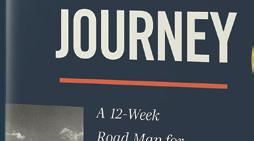










Ignite a disciple making vision for your church leaders.



RELATIONAL COMMUNITIES
SMALL GROUP LEADERS
A practical, fourteenweek workbook for small group leaders.

A RESOURCE FOR EVERY LEADER OR MEMBER OF YOUR CHURCH. CHOOSE YOUR RESOURCES HERE FOR




Learn to live in authentic, relational communities—the kind that Jesus modeled.



RELATIONAL DISCIPLESHIP
A nine-week workbook to practice authentic, relational discipleship.



EVERY MEMBER OF YOUR CHURCH A transformative 12-week road map for following Jesus in every sphere of life.

JIM PUTMAN is the Senior Pastor of Real Life Ministries in Post Falls, Idaho. Jim’s passion is discipleship centered on following the teachings and methodologies of Jesus. Learn about all his resources at JimPutman.com




By Laura McKillip Wood
Denford Chizanga's life is a testament to transformation—not only the transformation of his own, but also transformation in the lives of countless people across Africa. Growing up in rural Zimbabwe, Denford began his education in a small village before moving to Harare, the country’s capital, to continue his education. He initially trained as an electrical engineer but felt a powerful calling from God to dedicate his life to ministry.
Through this conviction that God was calling him to ministry, Denford started working with Greencroft Christian Church in Harare, Zimbabwe in 1995. He saw the need for a deeper understanding of the Bible, so he began studying on his own, learning as much as he could through his own studies and through interacting with other Christians. Wanting more than that, he decided to pursue a Certificate in Pastoral Studies at Zimbabwe Christian College, which led him to seek even more education. By 1998, Denford had moved to the United States to attend Cincinnati Christian University. There he earned a bachelor’s degree and two master’s degrees. Although many international students attend college in the United States and end up staying after their graduation, Denford felt a deep call to return to his homeland to serve his community. So he returned to Zimbabwe to begin ministering there again, this time with more education and experience and a wider and deeper knowledge of the world and of God’s Word.
Upon his return, Denford reunited with Shingirirai, a young lady he had met at Greencroft’s youth group years earlier. They married and had two daughters and one son. In 2002, while building their marriage and their family, the couple founded Africa Development Mission (ADM). Their goal was to share the gospel of Jesus Christ and empower local communities. The ministry focuses on three primary areas: church planting, leadership development, and community transformation.
Since ADM’s inception, Denford, Shingirirai, and their co-workers in ministry have planted over 37 churches across Zimbabwe, Zambia, Mozambique, and Malawi. The churches have continued to grow and thrive; some have constructed their own buildings and all have made significant impacts on their communities. As more leaders are trained, the Chizangas’ vision of expanding their reach into southern, central, and northern Africa is becoming a reality. According to Denford, this group operates with the goal of “helping individuals, churches, and organizations reach their full potential in making Jesus known to all nations and people groups.” They train the local people to lead their churches and reach out to others in their communities with the love of Christ and practical support.
At the heart of ADM's work is the investment in church and community leadership. The organization offers an internship program for emerging leaders, providing hands-on ministry experience, and teaches vocational courses in agriculture, building, and computer technology. ADM equips students to remain in their communities and minister while also providing practical experience that enables them to support their families and develop their communities. ADM also sponsors students to attend Bible colleges in Zimbabwe, ensuring that future pastors and evangelists are wellequipped to lead. To date, ADM has sponsored more than 550 students, with many already serving in their communities. In addition, the ministry offers ongoing training, resources, and seminars to empower leaders and strengthen the churches they serve.
“The Chizangas understand that ministry isn’t just about spiritual growth but also meeting practical needs. ADM focuses on five key areas: education, healthcare, clean water, food relief, and income-generating projects. They sponsor schoolchildren to ease the financial burden on families, support five rural schools, and strive to improve local health clinics. Through their Water Project, ADM has drilled over 151 deep wells, providing communities with clean, safe drinking water, which is an essential foundation for health and well-being. The project also enables families to grow vegetables and start community gardens, contributing both to improved nutrition and additional income. “Families are coming together to grow vegetables, improving their diets and providing financial stability,” says Denford. The organization’s approach to sustainability helps families become self-sufficient, fostering long-term success. As Denford puts it, “Assisting families with entrepreneurial potential to start income-generating projects is key to achieving sustainability.”
Denford’s most recent endeavor has been working with ICOM (International Conference on Missions). He was chosen as the president of the 2025 conference, which will be held in Atlanta, Georgia, November 20-22. As Denford says, “Nothing moves that is not compelled. Behind every movement there is a driving, compelling force.” Denford believes we must be inwardly driven and compelled to take the gospel to the world, going against all odds and facing all challenges in order to effectively introduce Christ to those who do not know him.
Though rewarding, the journey has not been without challenges. Denford has faced the difficulty of seeing the potential for life-changing impact while struggling at times with limited resources to fully realize it. Still, the most rewarding part of his work has been seeing lives transformed spiritually, socially, and economically. Denford’s passion is clear: bringing real, lasting change through the gospel of Jesus Christ.
For more information about Africa Development Mission and how you can support their work, visit their website at www.africadevelopmentmission.org. To learn more about ICOM, visit their website at www.theicom.org/ events/icom-2025.
The Chizangas understand that ministry isn’t just about spiritual growth but also meeting practical needs.
about the author

/laura.wood2
@woodlaura30
@woodlaura30
lauramckillipwood.com
lauramckillipwood@gmail.com

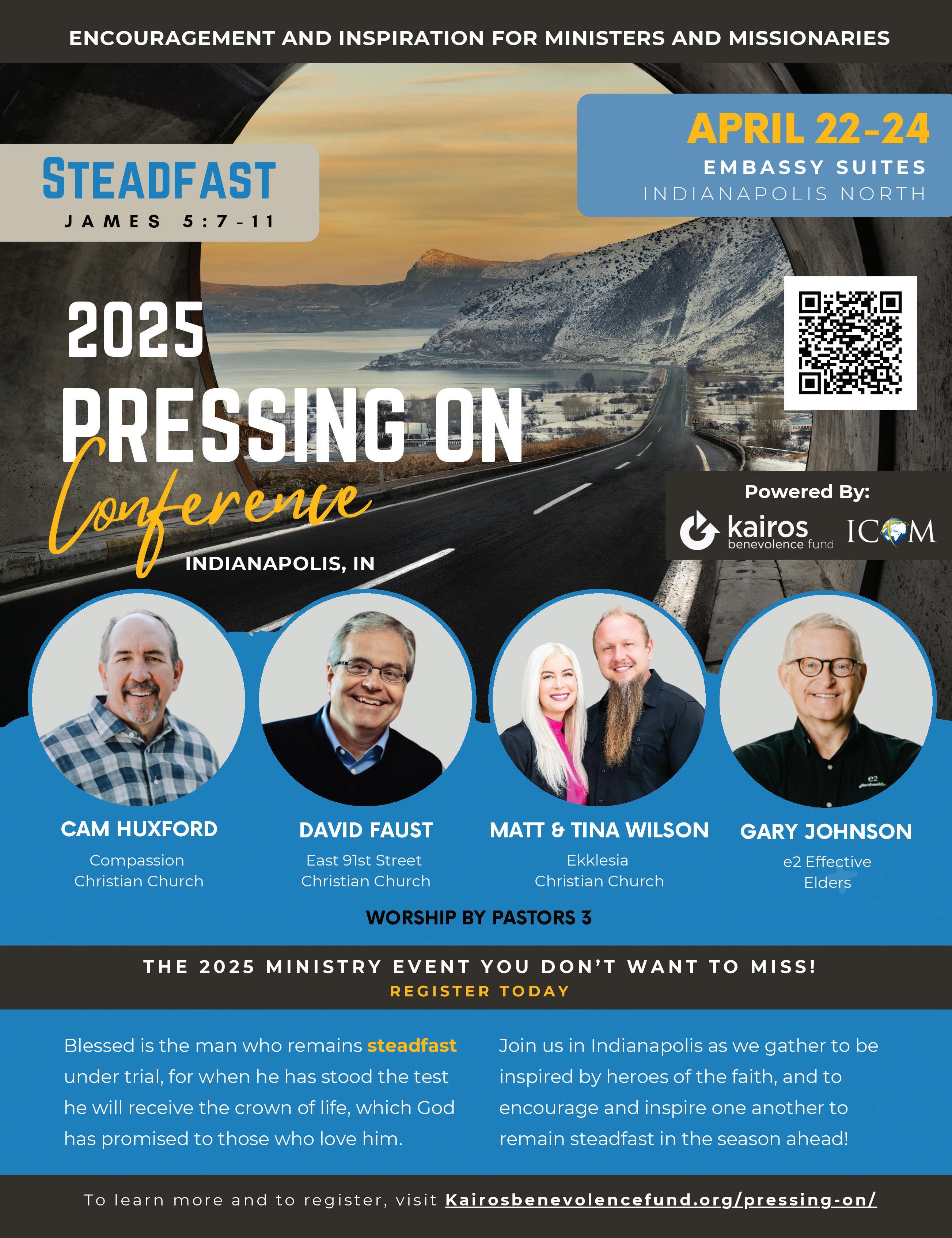
By Rudy & Osharye Hagood
With seven children and 12 grandchildren, our parenting journey has been a lifelong partnership with God. Our youngest child is now 25, a clear testament that we have been walking this road for decades. But what has this journey taught us? Simply this: parenting is more than a responsibility. It’s a sacred trust, a divine calling, and an act of stewardship.
At its core, parenting is stewardship. We are entrusted with these lives for a time, but we cannot control them. Stewardship says, “These children are entrusted to me. I will guide them with wisdom and love, but ultimately, they belong to God.” Ownership, on the other hand, says, “These are my children. I control their fate.” And we all know how that usually works out.
Perhaps the most encouraging verse for those of us who have raised children into adulthood is Proverbs 22:6. “Train up a child in the way he should go; even when he is old he will not depart from it” (English Standard Version).
Many parents hold tightly to this verse as a promise, expecting that faithful parenting will automatically lead to faithful children. But is this a promise, or a proverb?
A proverb is a literary device—a general truth applied to a specific situation. Proverbs are not absolute guarantees. They express what is typically true, not what is always true. If your child has not followed the way, it does not mean you are a failure. It means you still have work to do.
Consider Proverbs 20:7: “The righteous who walks in his integrity—blessed are his children after him!”
This means walking in integrity is our post. Our role is not to control outcomes but to remain faithful. To walk in his righteousness. To keep praying, guiding, and being a steady presence. We are to be their North Star until Christ becomes their true North.
Walk in integrity, not intimidation. Walk with character, not coercion. If you want your children to be blessed, stand at your post.
Limited Liability Parenting: A Holy Partnership
That’s why we’ve come to view parenting, especially parenting adult children, like managing a Limited Liability
Corporation (LLC). Not in the legal sense, but in the sacred stewardship sense. Humor us for a moment. . . .
God’s Limited Liability Corporation: A Parable on Parenting
God is the CEO, Founder, and Ultimate Shareholder. We’re just here on assignment with a title and a purpose, but limited liability.
Let’s break it down:
• Limited. We have our children under our care for a season. Our influence is temporary, but the impact is lifelong. They grow and they go. But the seeds we plant? Eternal.
“ AT ITS CORE, PARENTING IS STEWARDSHIP.
• Liability. We’re responsible for what we pour into them: our love, wisdom, discipline, and guidance. But we are not on the hook for every choice they make. That’s between them and their Maker. (Praise God for that clause in the covenant!).
• Corporation:Parenting takes structure, strategy, and vision. This isn’t a freestyle gig. We are building something that will outlive us. A legacy. A generational ripple. Some days we’re the COO and some days we’re the janitor.
And now, the real twist.
Pass-through Taxation. Every joy, every trial, every tear pass through us. But the profit? The growth, the fruit, and the glory all get deposited into God’s heavenly account. We’re the managers. God holds the books.
Flexible Management Structure. Some days we lead like generals. Other days we survive on grace and snacks. The Holy Spirit is our HR department, constantly retraining us on patience, kindness, and how not to lose it during bedtime.
Fewer Formalities. No suits required. No board meetings needed. Just prayer, surrender, and the occasional whispered, “Jesus, help me before I say something that disqualifies me from this job.”
So, welcome to Parenting, LLC. Where God owns the business, we manage the day-to-day, and grace handles the HR paperwork.
Persistence: A Lesson from Monica
One of the most powerful examples of patient, prayerful parenting comes from St. Augustine’s mother, Monica.
A man of great theological influence, Augustine did not come to faith easily. He spent years resisting, living a life filled with lust, pride, and worldly ambition. But his mother, Monica, never stopped praying. She wept, counseled, and interceded for him.
Eventually, at age 31, Augustine surrendered to Christ. He later wrote in Confessions about his mother’s relentless prayers: “She wept for me more than mothers weep for the bodily death of their children.”
Monica’s faithfulness reminds us that the seeds we plant do not always sprout immediately. Some take years—decades even—to bear fruit. But God is at work, even when we cannot see it.
Parenting Adults: The Silent Strength
As we have stated in previous articles, no one could have prepared us for the lifelong grind of parenting. It does not end when our children turn 18, or even when they become parents themselves. As long as we are alive, we will continue to hope, pray, and guide.
Parenting stretches our faith because our children’s struggles don’t just affect us; we feel them in our bones. Like a basketball coach, we can call the plays, but we can’t take the shot. We celebrate their victories and mourn their defeats, sometimes more than they realize.
“
about the authors
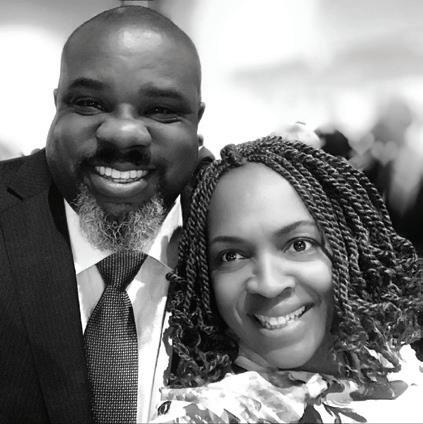
Rudy and Osharye Hagood have seven children and nine grandchildren so far. Osharye is a women’s minister who is also certified as both a life coach and a health coach. Rudy is a college professor with a background in social work. They love being married and love to bless both married and engaged couples.
@rudy.hagood
Parenting stretches our faith because our children’s struggles don’t just affect us; we feel them in our bones.
When our children are little and precious, we must love them more than we love how they make us feel. When they become adults, we have to fight for them more than they frustrate us. We fight by staying in prayer and staying at our post.
Perhaps the hardest lesson in parenting is learning to release our children into God’s hands. We pray for them to make wise choices, and often they don’t. We ask God to protect them, and often he allows them to walk through difficulty. Faith is not about changing God’s will. It’s about trusting it.
As parents, our job is to do our best and trust God with the rest. We have never been perfect, but God has always been perfect. Like you, we love our children and grandchildren deeply, but God loves them even more. And his love is perfect.
So let us stay in prayer and stay at our post. We walk in integrity, not intimidation. We guide with character, not coercion. In doing so, we remain their North Star, trusting that one day, Christ will be their true North.
Lord, thank you for the children you’ve entrusted to us, whether they’re toddling at our feet or raising families of their own. Teach us to walk in integrity, love without strings, and lead with grace. Help us stay at our post, trusting you with what we cannot control. Amen. @rudy_hagood_
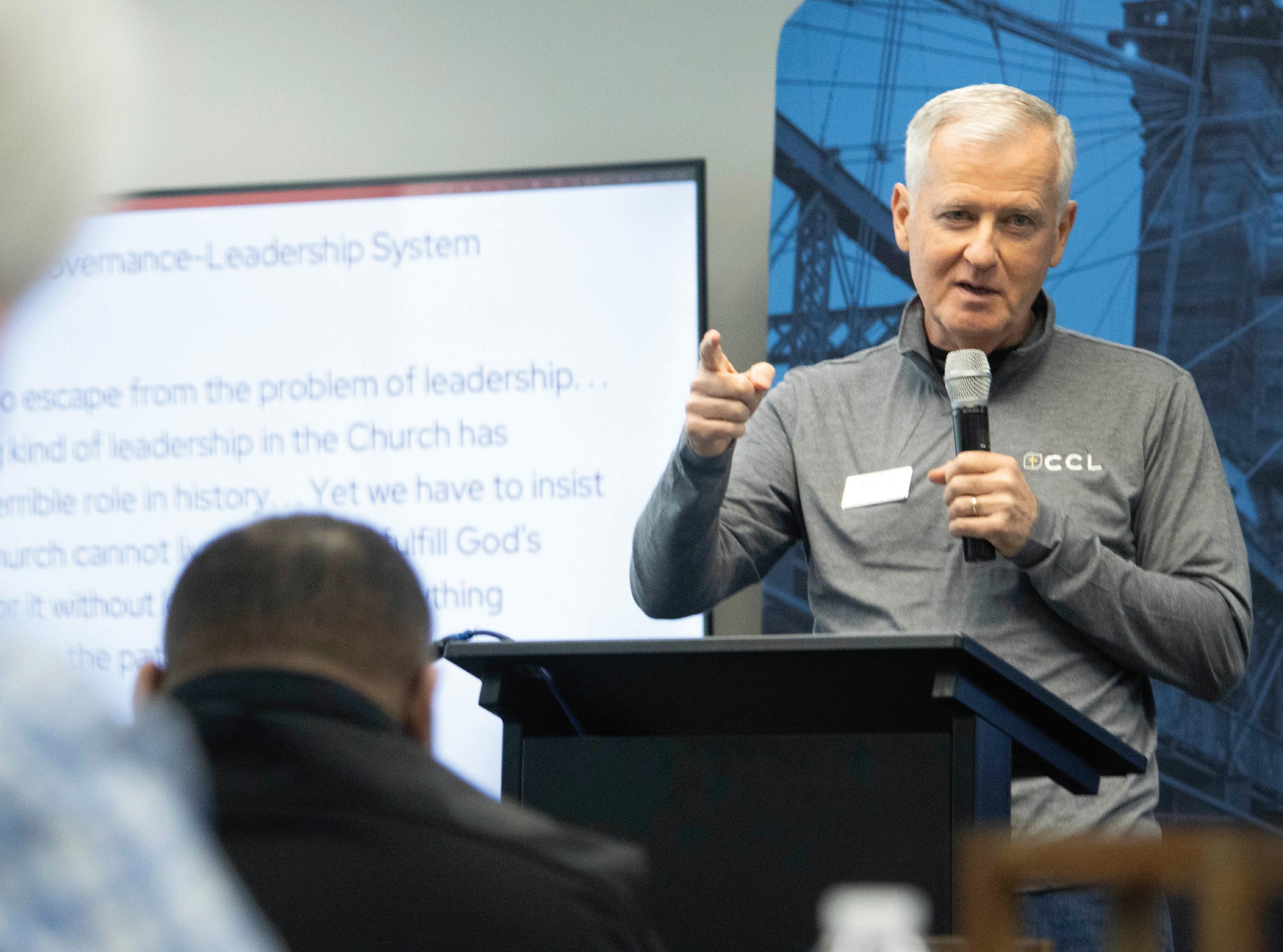




By Chris Philbeck
One of the undeniable truths about preaching is that some people are more interesting to listen to than others. Often the reason is personality, but that’s not an absolute truth. I’ve heard sermons from preachers with great personalities that fell flat because they lacked study, structure, and relevance. So, a great personality doesn’t automatically lead to great sermons.
But you can’t deny the power of personality when it comes to preaching. In fact, when researching this column I came across an article by Gary Millar (The Gospel Coalition) containing a lengthy quote from James Stuart Stewart (yes, that’s his name) in his book, Heralds of God that sums up the power of personality in preaching like this: “Be yourself and forget yourself.” He wrote, “God has given to each man his own individuality, and standardization (conformity) is emphatically no part of the divine intention for your ministry. How intolerably dull it would be if every preacher had to cut to the same pattern!” That’s when he wrote, “Be yourself, but also forget yourself.”
One way to understand Stewart’s words on a practical level is to remember that when we preach, we preach as individuals to individuals. When I have a conversation with someone, whether it’s someone I’ve known for years, or someone I’ve just met, I’m just me. I never think about trying to be someone or something else. I’m sure it’s the same for you. At the sake of being too simplistic, that’s what it means to be yourself, but also forget yourself. When God called you to preach, he called, you to preach with your own voice. Let that happen naturally.
When I first started preaching in 1982, it was a struggle. I had my homiletics class in Bible college and an expository preaching class in seminary, but while they taught me about the “academics” of preaching, they didn’t teach me how to preach with my own voice. Fortunately for all of us, the first step to finding your own voice in preaching is simply preaching. When my wife and I planted a new church in 1982, I had the responsibility of preaching every week. And not just on Sunday morning, but Sunday night as well. I still get a sick feeling in the pit of my stomach when I think about what a struggle that was for me and, I’m sure, for the people who had to listen. But the more I did it, the more familiar I became with my own unique preaching voice. It’s the same for all of us. One article I read while writing this column described it like this: Reps, reps, and more reps.
Another way to find your preaching voice is by listening to other preachers. I know that might sound confusing because the goal isn’t to copy someone else’s preaching voice, but that won’t be the case when you listen to a va-
“riety of different preachers. When I first started preaching, I would listen to a gospel radio station in Houston, Texas at least two to three weekday mornings where I would hear 30 minutes of preaching from several wellknown preachers. Bear in mind, this was in the early 1980s and most of them are not preaching today. But listening to the different styles helped me find my own preaching voice because it showed me the effectiveness of different styles of preaching and different approaches to preaching. This, by the way, also helped me develop the habit of listening to other preachers throughout my entire time in full-time ministry. In fact, carving out time in my weekly schedule to listen to at least one sermon online became non-negotiable for me.
The best way to find your preaching voice is to have a heart so overwhelmed by the truth of Scripture and the goodness of God, that you are compelled to preach. When that’s the case, the style of your delivery won’t be nearly as important as the passion of your delivery. And your preaching will be effective because your listeners will know that you believe what you’re preaching with all your heart. When that happens, you will preach the truth of God’s Word with your own voice. You will be yourself and forget yourself at the same time.
When you think about it, preaching is a strange thing. First, God calls us in our uniqueness. Not just the uniqueness of our personalities, but our backgrounds, our experiences, our wins, and our losses. I had a painful and often insecure childhood as my mother was married and divorced three times. I never knew my biological father and had no relationship with my adopted father. I battled a life-threatening cancer diagnosis in my 50s with a treatment plan that ravaged my body and left me with months of recovery and limitations I will face throughout the rest of my life. Those experiences shaped the way I preach because they shaped me. But God doesn’t just call us in our uniqueness, he also equips us with his power. And, as Paul learned in 2 Corinthians 12:9, God’s power is made perfect in our weakness.
So at the end of the day, our preaching voice is shaped by our calling from God, our dependence on God, and the personal faith developed from both. I love these words from Alistair Begg: “If people leave worship saying, ‘What an amazing preacher!’ we have failed. Instead we must long for them to say, ‘What a great God, and what a privilege it is to meet him in his Word, as we have just done.” That’s what happens when you preach as yourself and forget yourself at the same time.
When
we preach, we preach as individuals to individuals.
about the author





















By Kent E. Fillinger
I ’ve encountered many lead ministers who don’t want to know much, if anything, about their church’s budget or financial situation. But if we’re ministering in the world, we’ll have to deal with money. Even Jesus had a treasurer (John 13:29).
While a minister may not want to know what individuals in their church give, it’s wise for them to know about the annual budget, the average weekly or monthly giving, how much debt, if any, the church has, and what percentage of the budget is being spent to service the debt. Money is neither good nor bad. It’s a tool for getting things done and money fuels a church’s vision and ministry initiatives.
Our annual church survey asks several finance related questions to help us identify the financial health and trends in our churches. Here’s a detailed snapshot from our 2024 survey.
Church giving was flat.
In the last three fiscal years, just over three-fourths of churches (78 percent) have consistently reported that their annual giving has either met or exceeded their budget. The total reported giving for the last fiscal year for the 241 churches that responded to our survey was $434.6M and the overall average total giving per church was $1.8M, which was virtually identical to 2023.
The chart below shows the average weekly giving for each church size category based on giving units and on combined and in-person-only average worship attendance. Average giving was the strongest in our large churches and the weakest in our megachurches in 2024.
AVERAGE WEEKLY GIVING PER GIVING UNIT BASED ON AVERAGE TOTAL GIVING
AVERAGE WEEKLY GIVING PER GIVING UNIT BASED ON AVERAGE TOTAL GIVING
AVERAGE WEEKLY GIVING PER PERSON BASED ON IN-PERSON ATTENDANCE ONLY
Baptisms cost more.
One way to gauge your ministry efficiency and effectiveness is to determine how much money your church spent for each baptism (divide your total annual giving by the total number of baptisms).
“ It’s vital to trust, but always use technology and internal controls to verify everything related to your church’s funds.
Overall, the average church last year spent $17,269 for each baptism. This was an eight percent increase in cost from 2023. Megachurches consistently spend the least per baptism on average ($12,189) while having the best baptism ratio (the number of baptisms per 100 people in attendance). Last year, large churches (500-999 in total average worship attendance) spent the most per baptism on average ($34,381).
Cash reserves decreased.
Our 2024 church survey asked, “Approximately how many weeks’ worth of operating expenses does your church currently have on hand in cash reserves?” Overall, the 240 churches that answered this question reported they had an average of 22 weeks of cash reserves, down from 30 weeks in 2023. By comparison, churches in The Unstuck Church Q1 2025 Report reported having 32 weeks of cash reserves.
Very small churches in our survey once again had the most weeks of cash reserves (an average of 33 weeks) while emerging megachurches had the fewest weeks (an average of 16 weeks). Financial experts recommend churches keep 13 weeks of cash reserves to provide the margin needed to handle financial challenges or giving shortfalls. Overall, 43 percent of the churches in our survey reported having 12 weeks or less of cash reserves, which was up from 30 percent last year.
There are several reasons why churches need to maintain good cash reserves. Cash reserves level out the ebb and flow of revenue and expenses, they provide a financial buffer for unplanned events like an HVAC unit failing, and they provide the financial platform to take advantage of potential ministry opportunities that emerge, like hiring a staff member or purchasing needed property.
Church leadership should clearly communicate the purpose of cash reserves to the congregation by saying something like, “As good stewards of God’s resources, our church maintains the equivalent of three months’ funding of the annual budget for unexpected contingencies and ministry opportunities.”
Debt loads decreased.
Overall, 58 percent of the churches surveyed were debtfree in 2024, up from 50% in 2023. The total indebtedness for the 42 percent of churches was $381,053,232, an average debt load of $3,772,804 per church, which was two percent less than the year prior. Emerging megachurches were the most likely to report having debt (83 percent). Very small churches had the smallest percentage of churches with debt (21 percent). The spectrum of total indebtedness for individual churches ranged from $15,000 to over $27 million.
When calculating average debt per worship attendee (in-person and online) for each size category of churches, large churches had the smallest average per-person debt: $1,935 of debt per attendee. Very small churches once again had the largest average per-person debt: $6,594 of debt per attendee.
Financial crimes have exploded.
In 2020, church crime amounted to $67 billion around the world. Today, that number has jumped to $92 billion and is expected to reach almost $400 billion by 2050. Those crimes happen globally and here in the U.S.
A 2022 Lifeway Research study found one in 13 (eight percent) U.S. Protestant churches have had someone embezzle money from their church. More than nine in 10 pastors (92 percent ) say they are not aware of any past instances. The rate is statistically unchanged from 2016 when nine percent reported previous embezzlement and 91 percent were unaware of any.
Highly concerning is the Lifeway report that found Restoration Movement pastors twice as likely than the national average to report having experienced someone embezzling funds in their church (16 percent).

The digital age offers more opportunities for tech-savvy individuals to steal more church funds and cover their tracks in ways that weren’t possible before. Your church’s governing board and senior pastor have a fiduciary and legal responsibility to ensure that your church is mitigating the risk of fraud. Fiduciary responsibility means an obligation to act in the best interests of an organization. Your governing board has the fiduciary responsibility of ensuring that the proper processes are in place for financial security.
In their Church Financial Field Guide, CapinCrouse shared these steps you can take to prevent the likelihood of fraud.
Trust but verify. Ignoring vulnerabilities or believing that fraud won’t happen in your church is not the answer. It’s vital to trust, but always use technology and internal controls to verify everything related to your church’s funds.
Assess your controls. Ensure that your church has a solid plan to reduce the risk of fraud. Confirm the proper segregation of duties, including separation between recording, safekeeping, and authorizing. Develop a policy to review the segregation of duties of key staff or volunteers at least annually and whenever duties change or are reassigned. Implement best practices related to general ledger disbursements, bank reconciliations, journal entries at the close of each month, receipting and contributions, payroll, credit cards and expense reports, and accounts payable/cash disbursements. Create a written month-end close process that notes specific individuals assigned to tasks and responsibilities and incorporates a review process. Plan for how you will respond to fraud if it occurs. The plan should include steps to take and questions to ask.
To learn more about safeguarding your church, go to the ECFA website (ecfa.org) and search for 9 Essentials of Avoiding Church Fraud.
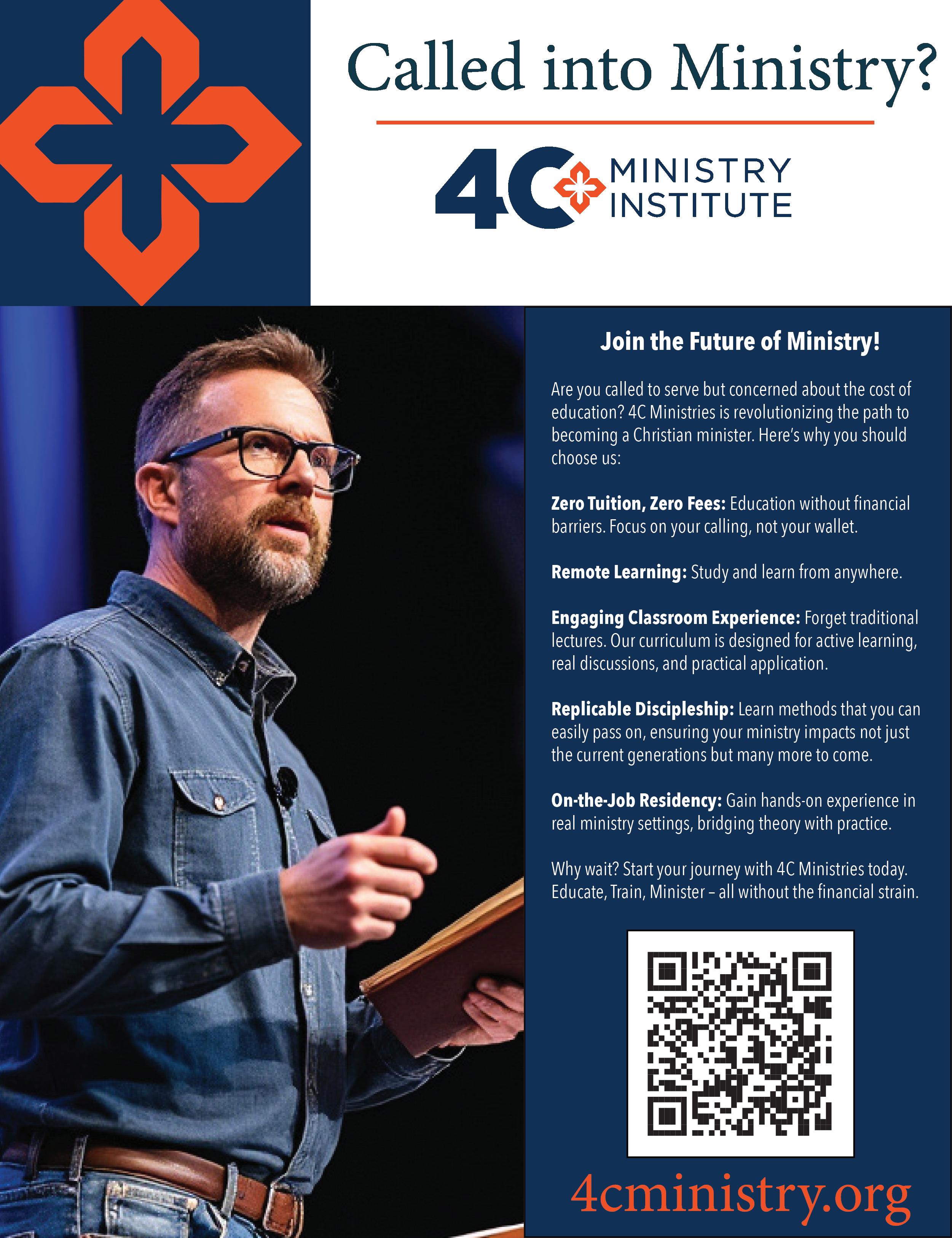
THE ARMOUR OF GOD
WINNING THE FIGHT WHEN YOU CAN'T SEE THE ENEMY
Ephesians 6:10-20
Dr. Mark Scott
01 02 03 04
Jim Valvano was a famous basketball coach. He won a national championship in 1983 when he coached for North Carolina State. He later went on to become a TV sports broadcaster. But at a very early age he got cancer. He was interviewed by another sports broadcaster who said, “Jim, you won a national championship and rose to the top of your career in broadcasting. But you couldn’t whip cancer. What kept you going?” Valvano answered, “I found a strength outside myself.”
Years ago I held a revival in a small town in Kansas. I arrived at the church building early on the Sunday morning to set up the Ozark Christian College display. In walked an elderly woman. I would later find out that she was 96 years old. Her name was Agnes. She lived her entire 96 years in that small town, and she was moving—to Oregon. I asked her why she was moving. She said, “Kids— can’t do anything with them these days.” (Her kids were in their 70s and lived in Oregon.) She had been a member of that church since it began (24 years earlier). I inquired, “Where did you go to church before coming to this church?” She mentioned the name of the church. I asked, “How long were you a member of that church?”
She said, “Fifty years.” I said, “Wow, that’s a long time to be a church member and then leave the church.” Agnes responded, “I didn’t leave the church; the church left me.” But Agnes never said a cross word about that church or its members because Agnes knew who the real enemy was.
I played football in high school. When I was issued the football gear, I did not know that one of my pads was missing from the hip girdle. The missing pad covered a vulnerable spot. Not far into the season my backside was black and blue. I got to thinking, “If you are going to play in the game, you’d better get all of your equipment.”
For seven years we ministered in rural Illinois. Harvest season was great, but it could be dangerous. One fall, a little boy was helping his dad bring in the harvest and he got his arms caught in the corn augur. It severed his arms. They flew the boy and his arms to the hospital. An outstanding surgeon did some surgery, but more surgery would be required the next day. The surgeon met with the troubled parents the night before the additional surgery the next day. He told them, “Do you see these (looking at his hands)? These are the best in the business. They don’t come any better than these.” Sounds arrogant, doesn’t it? But then the doctor went on to tell them, “But before I lay a hand on your boy tomorrow, I will have prayed to God for one hour.” I was not at the chapel service at Lincoln Christian University when that boy came to the chapel service to thank the students for their prayers, and he clapped his hands. That doctor knew that if you are going to do anything significant for God you had better pray like crazy
Do those stories echo in your ears when you read Paul’s words in Ephesians 6:10-20? The last exhortation in this circular letter that unpacks God’s plan to sum up all things in Christ (Ephesians 1:9-10) started with the word, Finally. If we are to engage in spiritual warfare, we will need to first Find a Strength Outside of Ourselves (10). Paul said, “Finally, be strong in the Lord and in the strength of his might” (English Standard Version). The phrase “be strong” means to “be clothed with power” or “empowered.” But like Coach Valvano, this power doesn’t rise up from within us. It is given to us by God. It is “in the Lord” and in “his might.” Gideon found that out (Judges 7:20). Samson found that out (Judges 16:28). King David found that out (1 Samuel 17:45). If we go to battle against our enemy in our own strength, we will fail. But the enemy will fail when we fight in God’s strength. Winston Churchill said, “Nothing is as thrilling as being shot at without success.”
Second, to win the fight against this unseen enemy we will need to Know Who the Real Enemy Is (12). Our battle is not against flesh and blood. Our battle is not against people. People are small potatoes. Our battle is not against the church down the street. Our battle is not against the government. Our battle is not with our families. Our battle is not even against ourselves. In fact, Fred Craddock used to say, “Anyone at war with themselves will make causalities out of his loved ones and friends.”
Our fight is “against the rulers, authorities, cosmic powers in the present darkness, and the spiritual forces of evil in the heavenly places.” These phrases in Paul’s day described unseen powers of the spiritual realm. They are very real—just unseen. Maybe we are unaware of them because our enemy is very deceitful and disguises himself as an angel of light (2 Corinthians 11:14). Maybe we do not recognize him because he is known by over 20 different names in the Bible and has his own “schemes” (methods). In Ephesus these unseen forces were at work in the Artemis Cult (Acts 19:23-41).
William Barclay said that this deception works in three ways: 1) He makes us think that we will be satisfied with what he offers. We will not be. 2) He offers us excuses and rationalizations. Nothing becomes our fault. 3) He makes us think that we will escape punishment. Not.
IF WE GO TO BATTLE AGAINST OUR ENEMY IN OUR OWN STRENGTH, WE WILL FAIL.
BUT THE ENEMY WILL FAIL
Third, if we are going to win the fight then we need to Get Dressed (11, 13-17). Going around without our spiritual armor on should embarrass and disturb us. If Paul is writing during his first Roman imprisonment (i.e., meaning his house arrest in Acts 28), maybe he looked down the hallway and saw a Roman soldier. This might have caused Paul to begin associating various pieces of armor with the Christian life. The soldier’s armor becomes an allegory. The belt is associated with truth because truth holds us up. The breastplate is associated with righteousness because it protects the real vital organs. The shoes are associated with the gospel of peace because we walk about in it. The shield becomes associated with faith because it protects us from the attacks of the enemy. The helmet is associated with the head because it protects the mind— which is where all sin begins. And finally, the sword (the only offensive weapon in the list), is associated with the Word of God (and by the way, it is the “spoken word,” so it probably refers to the Christian message and preaching more than the B-I-B-L-E per se). This is our offensive weapon. Howard Hendricks said, “Dusty Bibles lead to dirty lives.” Do not be a spiritual streaker. Get your armor on every day. Since our enemy is not in the flesh neither should we battle in the flesh (2 Corinthians 10:3-5).
Finally, if we are going to win the fight we must Pray Like Crazy (18-20). The surgeon who reattached that boy’s arms knew he would need help from above to do what was necessary. Is this a lesson that we have to relearn? Paul tells the saints to “pray in the Spirit.” That doesn’t have to be something really mystical. I like how Kenneth Taylor put it in The Living Bible. He said, “Ask God for anything that is in line with the Holy Spirit’s wishes.” Paul also said to pray for the saints—not pray to the saints but pray for the saints. This is intercessory prayer.
Paul also said to pray for him. Here was an apostle, and he was requesting prayer. And Paul specifically wanted prayer for himself with regard to his boldness. Clarence Jordon said it this way, “Pray that I can lay it on the line as I should,” (The Cotton Patch Version). Let us go forward on our knees. You cannot stumble when you are on your knees. Pray like crazy.
We have a battle to fight, but we can gain the victory if we find our strength in the Lord, if we know who the real enemy is, if we get dressed with God’s armor, and if we pray like crazy. Like other students in my church history class, I laughed when we studied about Martin Luther. One day, while in his study in Germany, he thought he saw the devil on his wall. This so angered him that he yelled at the devil, “You can’t hurt me because I have been baptized.” And then he threw his ink container at the devil. I thought in my more naïve life, That’s silly. I mean really. Did he think that he would hit the unseen enemy with an inkwell? But I do not laugh at Martin Luther anymore. I have seen what the enemy has done in marriages, families, churches, communities, and nations. I do not laugh anymore.
In 1929 a book came out entitled All Quiet on the Western Front. It was a novel about WWI. The man who wrote it, Erich M. Remarque, fled Germany and became a U.S. citizen by 1947. He died in 1970. But I would suggest that today nothing is quiet on any front. I cannot think of one category of reality where the enemy is not trying to take ground. Education? Politics? Governments? Gender? Religion? My dad used to say, “Does the devil frown or smile when you get up in the morning?” We are in a fight with an unseen enemy, but if Jesus is our captain, there is no way we can lose.
IF WE ARE GOING TO WIN THE FIGHT WE MUST
By Jack Cottrell

Exactly what is the work of Satan and his demons? In general, their overall goal is to defeat God’s plan and purpose by all possible means. In the beginning (Genesis 3:1ff). Satan tried to do this by corrupting mankind at its fountainhead; but foreknowing this, God had already prepared his plan of redemption through Christ. Then when Christ came, Satan tried to achieve his goal by attacking the Redeemer himself. Working through Herod, he tried but failed to kill him in his infancy (Matthew 2:1-15; Revelation 12:1-5). He then tried and failed to tempt Jesus to abandon his mission (Matthew 4:1-11). Finally, working through Judas, he sought Jesus’ death (John 13:2; 1 Corinthians 2:8), not knowing this would be the means of his own defeat (Hebrews 2:14).
Having failed to prevent God from carrying out his plan of salvation, Satan now focuses on specific individuals, seeking to cut them off from God’s saving grace (1 Peter 5:8). As a finite creature he cannot do this alone (he is not omnipresent) but must enlist the help of the lesser evil spirits, the demons, who are his “angels” or representatives. Working together they assault individuals in three ways: on the levels of the mind, the will, and the body.
Satan’s main strategy is to attack our minds through false teaching. Above all else he is a liar and a deceiver (John 8:44; Revelation 12:9; 20:3,7-10). Since the beginning he has been lying about God and attacking his Word (Genesis 3:4-5; Luke 8:12). He disguises himself as an angel of light (2 Corinthians 11:13-15) and blinds the minds of the unbelieving (2 Corinthians 4:4). His strategy depends upon deceitful schemes and snares (2 Corinthians 2:11; Ephesians 6:11; 2 Timothy 2:26). We are constantly bombarded by “deceitful spirits and doctrines of demons” (1 Timothy 4:1, New American Standard Bible 1995), as they work through false prophets (1 John 4:1-3). Demons inhabit the false religions of the world and are the reality behind all idolatry (1 Corinthians 10:14-22; Deuteronomy 32:17; Psalm 106:36-38). Satan can even empower people to work miracles to give pseudo support to his lies (Matthew 7:21-23; 2 Thessalonians 2:9; Revelation 16:14).

The second strategy is to attack our wills through temptation. Satan is evil, and he wants to make us like himself. He wants us to share his sin so we will share his condemnation (Matthew 25:41). By putting pressure on our wills he leads us to act in sinful ways. The mechanics of temptation are not clearly explained to us, but we can discern some of them. Often the acceptance of a lie in itself creates a path that the will gladly follow. Demons may manipulate our subconscious through subliminal suggestions (e.g., John 13:2). They may influence our thoughts by bringing certain ideas and images into our consciousness. They stoke the fires of our sinful desires and exploit our spiritual weaknesses. They work indirectly upon our wills through other people.
Satan’s third strategy is to attack our bodies through demonic presence and control. This is commonly called demon possession, but a better term is demonization. The Bible shows us that Satan and his demons can manipulate aspects of the physical world (Job 1:12, 16, 19; 2 Thessalonians 2:9). They can cause some physical illnesses (Job 2:7), often by their very presence within the body (Matthew 9:32-33; 12:22; Mark 9:17-27; Luke 13:11,16; Acts 10:38). When they control the body, they control the nervous system. Thus if a demon has entered a person’s body, it can bypass that person’s own mind and will and can directly produce thoughts, words, and actions through the commandeered brain and body.
Are Satan and his demons still working today? Yes, on all three levels. Few Christians doubt that he still employs the first two strategies; thus they are on guard against temptation and false doctrine. The controversial issue is whether demons are able to invade the bodies of individuals in our time. Again, the answer is yes. Westernized, secularized skeptics need only to hear the testimony of anyone who has done mission work in an animistic culture to know this is the case.
Some believe that demonization was a phenomenon in the first century but ceased to exist after the apostolic era. A common argument is that God would not permit demonization and then leave us with no means of deliverance; but deliverance requires miraculous power, and miraculous gifts ceased after the apostolic age; thus God does not permit demonization today. The flaw in this argument, though, is the idea that deliverance requires miraculous power. In New Testament times some deliverance, like some healing, was definitely miraculous. But just as God can and does heal through his special providence in answer to prayer, so he can and does deliver people from demons through providential intervention in answer to prayer. This is truly a supernatural event, but supernatural events are not necessarily miraculous.
Another common argument against demonization today is based on the view that Satan was bound by Jesus at his first coming through his death and resurrection (Matthew 12:22-29; Revelation 20:1-3), which precludes any further demonization. This argument is also flawed. We agree that Satan has been bound since Christ’s first coming, but we reject the notion that this rules out subsequent demonic activity. Obviously the binding of Satan has not curtailed his other two strategies; why should it end all demonization? This is an arbitrary inference from the fact of his binding. In fact, Revelation 20:3 actually specifies the purpose and result of this binding, i.e., “so that he would not deceive the nations any longer.” This places certain limitations on his work but does not produce the absolute cessation of any of it.
We judge that these and other arguments against demonization in our day are not valid. The devil is still a roaring lion, looking for victims (1 Peter 5:8).
A question to be asked at this point is whether Christians are susceptible to Satan’s attacks. The answer is yes, and this is seen in the fact that the New Testament frequently directs Christians to be on guard against the devil and his wiles. Satan is “your adversary,” says 1 Peter 5:8; therefore “be on the alert.” James 4:7 warns us to “resist the devil.” “Do not give the devil an opportunity,” says Ephesians 4:27. We are in a struggle with these spiritual forces, says Paul, and thus must be sure we are clothed with the full armor of God (Ephesians 6:10-17). Those who are not on guard against deceitful spirits may fall away, says 1 Timothy 4:1 (see 2 Corinthians 11:3).
Though Satan and his demons are doing their best to take control of our minds, wills, and bodies, we must remember that they are created beings and do not have infinite powers; they are under God’s control. Also, we must remember that Jesus Christ has already met them in battle and decisively defeated them, and we are on his side and share his victory over them. One of the reasons Jesus came was to meet and defeat the devil (1 John 3:8). Through his death and resurrection he has rendered Satan powerless (Hebrews 2:14) and disarmed the demons (Colossians 2:15). He has defeated and bound the devil, limiting his power (Revelation 12:79; 20:1-3). The Holy Spirit within us is greater than evil spirits (1 John 4:4).
Nevertheless we will share in this victory and power only if we heed the warnings noted above. We are under attack, but we have been given sufficient resources to repel these attacks—if we avail ourselves of these resources. How can we do this?
First, we can prevent Satan from taking control of our minds by knowing the truth. The first item in the armor of God is truth: “having girded your loins with truth” (Ephesians 6:14). This is our most basic form of defense against the devil; knowing the truth set forth in God’s Word is crucial to freedom from deception (John 8:32). Just knowing what the Bible teaches is not enough, however; we must also believe the truth and love the truth (2 Thessalonians 2:1012). We must take it into our hearts and delight in it and wield it boldly and proudly in our personal lives and in our church activities.




Second, we can resist Satan’s temptations by submitting our wills to the sanctifying power of the indwelling Holy Spirit (Ephesians 6:14-18). Through his power we can put sin to death in our lives (Romans 8:13). He gives us an inner strength to walk in paths of righteousness, a strength that is greater than Satan’s alluring temptations (Romans 8:14; 1 John 4:4). The more we actually walk in and practice righteousness, the stronger we will be. Righteousness is, in fact, the second item of the armor of God: “having put on the breastplate of righteousness” (Ephesians 6:14).
Third, we can prevent demons from entering into our bodies by avoiding activities that give them an opportunity to enter (Ephesians 4:27) and by consciously trusting in the protecting name and blood of Jesus Christ (“the shield of faith,” Ephesians 6:16). Activities that open one up to demonic intrusion include idol worship, gross immorality, occult practices, seeking supernatural knowledge or powers, and mysticism or mystical trance states. When one walks in paths of righteousness and wears the armor of God, he need not fear being invaded by evil spirits.
A common idea is that demons cannot inhabit the bodies of Christians at all; thus we need not be concerned about this. The main argument is that a demonic spirit and the Holy Spirit cannot be present in a person’s body at the same time. Such a view is never taught in Scripture, however; it is an inference based on false assumptions. It assumes that the Holy Spirit and evil spirits are present in a person’s body in the same way, as if somehow they would be competing for space. This is not true. The Holy Spirit and evil spirits are two completely different kinds of spirits, existing on two vastly different metaphysical levels. The Holy Spirit is divine, infinite, uncreated Spirit; demons are finite, created spirits. They may both indwell the same body because they do not do so in the same sense. Those involved in deliverance ministries are practically unanimous in affirming that Christians may be demonized.
Nonmiraculous deliverance from evil spirits (“casting out demons”) is sometimes necessary and always possible today for oppressed persons who are nonetheless surrendered to the
Lordship of Christ. “Release to the captives” is part of the gospel (Luke 4:18). In general the works of Neil Anderson may be used for this purpose, especially the steps he outlines in The Bondage Breaker. See also the works by Dr. Ed Murphy (The Handbook for Spiritual Warfare), Grayson H. Ensign (Counseling and Demonization: The Missing Link) and Grayson H. Ensign and Edward Howe (Bothered? Bewildered? Bewitched?).
In short, Satan and his demons are real, active, powerful, and dangerous; but they are no match for our divine and almighty Redeemer, Jesus Christ. Jesus has already crushed the serpent’s head (Genesis 3:15) in his victorious death and resurrection, and he will soon crush Satan under our feet (Romans 16:20).
This article has been excerpted from Section III, “The Work of Evil Spirits,” and Section IV, “Christians and Spiritual Warfare,” of Chapter 8, “Angelic Sin: Satan and His Demons,” in The Faith Once for All, by Jack Cottrell. Used with permission, College Press Publishing Company, Joplin, Missouri (www.collegepress.com ).

By Greg Pruett

The Yalunka churches had struggled without a formally trained pastor for over 20 years, when a young man named Sori finally stepped up to take three years of training at the Bible school. We invested significantly in Sori. The church had never had a paid pastor, but they saw the opportunity to have their first ever full-time preacher, dedicated to strengthening their church, but also to traveling around evangelizing and starting new local churches in completely unreached villages. They arranged to provide food for his family so he could focus on preaching. Only a few Yalunka villages had a church, so there were plenty of opportunities to make disciples. We had begun to dare to believe that the tide had turned and the Yalunka church could finally multiply. Then, Sori tragically died in a motorcycle accident just five months after he started. This catastrophe felt like a vicious attack from Satan. It took us 20 years to raise up a trained pastor, but only a moment for an accident to destroy Sori and his pastoral ministry.
Sometimes church planting among unreached peoples feels like a decades-long spiritual knife fight. We strike a blow for the kingdom, then the forces of evil stab us right in the back. Satan is mean as a snake. How do we bring to bear the full power of prayer to deal with the unseen forces of darkness on the mission field?
Sometimes when people become aware of the reality of spiritual warfare, everything becomes about that. Other people become aware of spiritual warfare for a time and address it for a season of life, but then they lose track of it. I have compared spiritual warfare to changing the oil in my car. I don’t have to change the oil in my car if I don’t want to. And it will be fine . . . for a long time. Then the engine might blow up.
Spiritual warfare is similar. You can do without it just fine for a long time . . . and then your ministry might blow up. I regularly practice these seven tools for spiritual warfare about one to three times a week.

Put on God’s Armor.
I spend time regularly praying for help to put on each piece of God’s armor, but not as some kind of magical incantation. Instead, I like to reflect profoundly on the meaning of each armament. It fascinates me that the armor that defeats Satan isn’t creepy, magical stuff like we see in the movies. The explosive spiritual power that roughly shoves aside the darkness turns out to be living the fundamentals of the Christian life.
Paul teaches us the following truths in Ephesians 6:13-18. Protect your core with truth. Cover your heart with right living. Train hard to race from place to place with the Good News. Block Satan’s temptations with faith in God and a faithful life. Refute the thoughts the devil would insert into your mind by intimately knowing that you are saved and by listening to your Savior. Sharpen your knowledge of Scripture so the Spirit can use it to cut away Satan’s strongholds in peoples’ lives. Protect the backs of your fellow soldiers every day by covering them in prayer. That’s how we fight with God’s weapons! Armor up. Think about how each weapon protects your vulnerable soul.

“Lord, deliver us from evil: evil people, evil thoughts, evil spirits, and evil events.” My regular prayers elaborate the words of Jesus:

Pray, “Deliver Us from Evil.”
Jesus taught us to pray for God to deliver us from evil. So, following the example of the prayer Jesus taught his disciples, I often pray, “Deliver us from evil.” The way it’s worded in the Greek language, it can mean either “deliver us from the evil one” or “deliver us from evil” in general. So I take the opportunity to pray against both.
The Bible talks about evil people, evil thoughts, evil spirits, and evil events, such as catastrophes. My regular prayers elaborate the words of Jesus: “Lord, deliver us from evil: evil people, evil thoughts, evil spirits, and evil events.”
Ask God for Angels .
The work of angels clearly includes taking care of us. “Are not all angels ministering spirits sent to serve those who will inherit salvation?” (Hebrews 1:14). For me, part of spiritual warfare includes asking God to send mighty angels to guard my home and family. This is what angels look like.
I looked up and saw a man dressed in linen clothing, with a belt of pure gold around his waist. His body looked like a precious gem. His face flashed like lightning, and his eyes flamed like torches. His arms and feet shone like polished bronze, and his voice roared like a vast multitude of people (Daniel 10:5-6, New Living Translation).
If God sent one of these angels to protect you and your family, would demons be powerful enough to harm you? Ask God to send angels to guard you.

Dedicate the Places Where You Live and Minister.
Sometimes I walk around my house or workplace with my arms outstretched in prayer. “Lord,” I say, “as surely as the Tabernacle and the Temple were set apart for holy purposes, so I dedicate this house for the gospel of Jesus as a place of worship for you.” This resembles Jesus’ teaching for his followers, “Whenever you enter someone’s home, first say, ’May God’s peace be on this house.’ If those who live there are peaceful, the blessing will stand; if they are not, the blessing will return to you” (Luke 10:5-6).
Jesus believed in blessing homes to be places of peace. He commanded his disciples to do that everywhere they traveled. So can we.
Regularly dedicate your home in prayer as a place of peace, worship, and prayer.

As we prayed, we sensed a great spiritual breakthrough.

Drive out Demons in Your Home or Workplace.
There also comes a time when prayer is not the only thing to do. Whenever I walk around, dedicating my house or office to God, I also take that opportunity to command demons to leave it in Jesus’ name. I don’t know if demons can hear what I’m thinking, so I speak out loud. And I prefer to do that when my neighbors aren’t watching.
Try it out. Say, “In the name of Jesus, I command you to get out of this house and go wherever Jesus sends you.” Get used to driving out demons you can’t see. That’s an important habit in spiritual warfare.
Spiritual warfare requires repentance. When I cast out demons, I say, “Get out of this house, in Jesus’ name,” then I go on to add, “I have nothing to do with you and you have nothing to do with me.” Often when I say that last part, a secret sin that I have been harboring in my life will pass through my mind, as if the demons are answering, “Ah, but you do. You have this sin in your life. That’s the red carpet you rolled out for us.”
Then I say, “All right, as of right now, I am turning away from that sin. So now, I really do have nothing to do with you and you have nothing to do with me. You get out, in Jesus’ name.” I don’t mean to say that we need to be sinless to drive out demons; but we do need to continually repent and turn away from our sins to be in a strong spiritual position.
Recently our worldwide ministry endured a period of a couple of years that seemed
like one spiritual attack after another. I tried all six of the previous means of spiritual warfare only to get no relief. I was out of ammunition. We decided to try one more approach: our leadership team would all pray one Psalm a day (150 chapters) rephrasing the content to bless our colleagues. When we finished the Psalms, we sensed we were beginning to fight free of the attacks. But we continued praying: one Proverb a day asking God for wisdom for our ministry (30 chapters). We seemed to be making progress, so we kept going. We prayed through Psalms and Proverbs again to finish the year. By spreading the longest Psalm over three days, you can exactly fill a year with praying Psalms and Proverbs together twice. We prayed through Psalms and Proverbs for two whole years. As we prayed, we sensed a great spiritual breakthrough.
Jesus set the example of using Scripture to defeat Satan (Matthew 4:4). You can fight Satan in a similar way by praying the content of Scripture for the people you love. The Word has power.
Take Your Stand.
Don’t run around the battlefield barefoot in your gym shorts and a T-shirt. Put on the armor and take full advantage of all the weapons God gives you to fight! Don’t let demons hang around. Why let them turn temptations into addiction or conflicts into bitter fights? Instead, “take your stand against the devil's schemes” (Ephesians 6:13) and run them off in Jesus’ name. Imagine what your life can be like when they are gone.
Greg Pruett is president of Pioneer Bible Translators in Dallas, Texas.
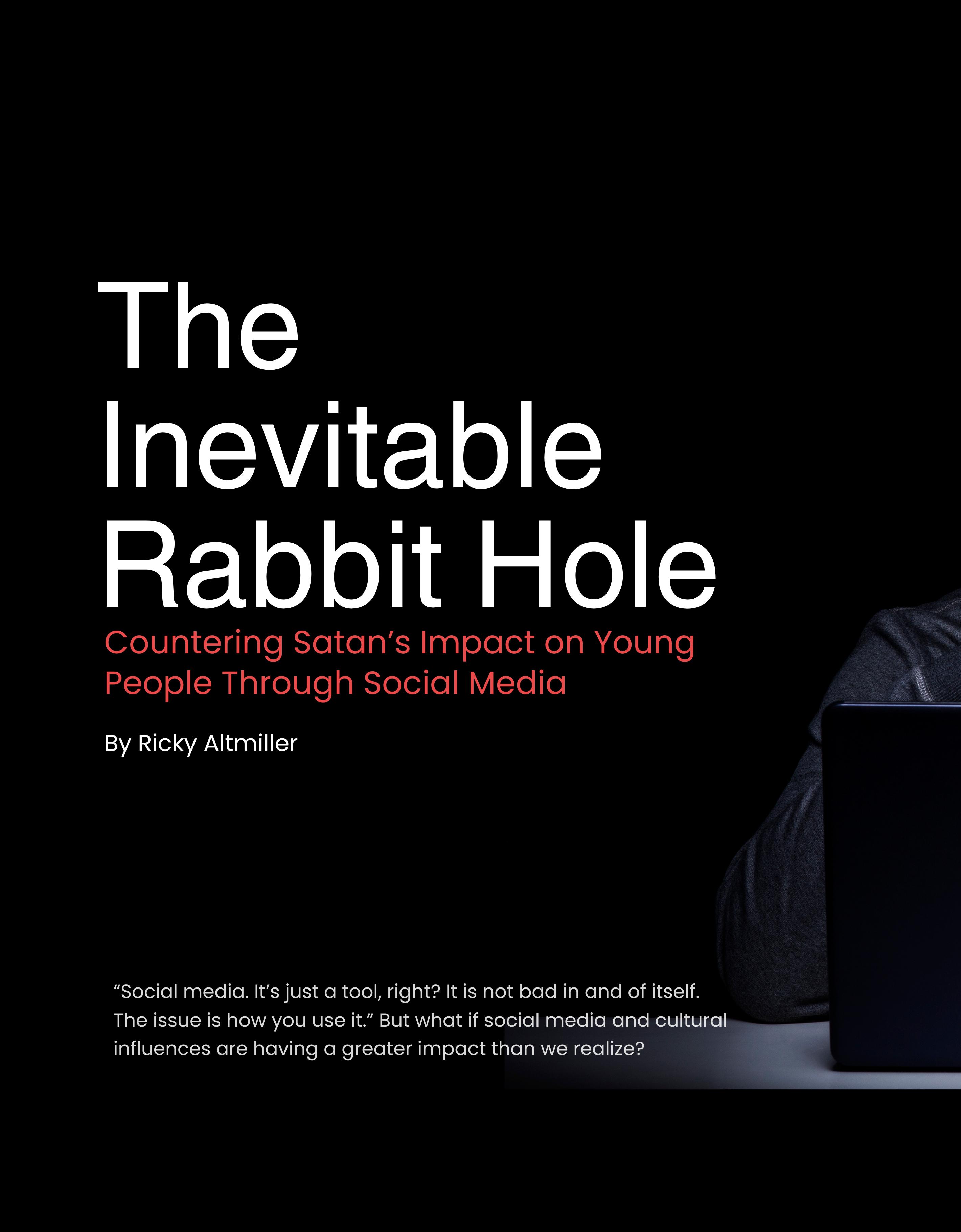

We have all been there. Seconds turn into minutes, minutes turn into hours, and down the inevitable rabbit hole we go. We fall into a digital information and social spiral that takes us places we never thought we would go, landing in a foreign metaverse. We spend vast amounts of time on clicks, videos, articles, and reels, ending up in an unknown realm. Everything looks the same but feels very different. Sometimes we come out feeling discombobulated and other times we come out feeling empowered and enlightened. Most Generation Z teens (born between 1999 and 2015), many of whom are in middle school and high school, take this journey multiple times a day.
The primary battle zone resides in the mind. This makes sense, as the mind is the communicator and controller of all aspects of our bodies. Control the mind, control the body. In Genesis 3, Satan proposed a thought of doubt or distorted truth. The serpent said, “Did God really say?” Eve confirmed the statement, but Satan replied, “You will not certainly die.” It was at this moment Eve shifted from a foundation of truth to a foundation of a perversion of truth. “When the woman saw that the fruit of the tree was good for food and pleasing to the eye, and also desirable for gaining wisdom, she took some and ate it. She also gave some to her husband, who was with her, and he ate it. Then the eyes of both of them were opened” (Genesis 3:1-7, New International Version).
Is this not the same spiritual war we are facing today? Satan’s conniving ways have not changed. Teens are engulfed in a culture and landscape the Barna Research Group describes as “Digital Babylon.” This is where we find ourselves as we attempt to make disciples of teens who will also make disciples.

Their goal is not just to get a consumer to like their product, but to control their mind by consuming their time, thoughts, and interests.

When we think of spiritual warfare, the spectrum can run from subtle questioning of truth to the extremes of demonic possession and Satan worship. All are prominent in our culture and world. We need to be prepared to face all fronts. But the broader, more detrimental impact on our teens today is psychological manipulation through social media platforms. Here is where culture, politics, fluidity of truth, pornography, misinformation, greed, and so much more collide.
Based on a Gallup Poll conducted in 2023, “on average 51 percent of teens use social media on various platforms for at least four hours a day.” The other 49 percent use social media less than four hours a day. This amount of online interaction is also accounting for the extreme increase in the mental health pandemic that has hit our teens. Researchers and mental health professionals have traced this spike to the year 2010. What is significant about this year? Jonathan Haidt, in his book The Anxious Generation: How the Great Rewiring of Childhood Is Causing an Epidemic of Mental Illness, marks the year 2010 as the beginning of the “phone-based childhood.” This is a period when children, including adolescents, began growing up with devices that connected them to the internet. He also describes what he calls “the Great Rewiring” that took place between 2010-2015. He asserts that teens, when they are not on social media, are still thinking about it. “It has enormous implications for cognition, addictions, and the wearing smooth of paths in the brain (not the decision of a rational consciousness), especially during the sensitive period of puberty.”
This is scary when viewed alongside Romans 12:2, which says, “Do not conform to the pattern of this world, but be transformed by the renewing of your mind. Then you will be able to test and approve what God’s will is—his good, pleasing and perfect will.” No wonder we have confusion over truth, over identity, over purpose, and much more. This is a massive spiritual attack on our teens that continues today.
Around that same time, social networking platforms evolved into social media platforms. Facebook had
just introduced the Like button. In The Social Dilemma, a 2020 Netflix documentary, the co-inventor of the Facebook Like button, Justin Rosenstein, said, “Our entire motivation was, ‘Can we spread positivity and love in the world?’ The idea that, fast forward to today, teens would be getting depressed when they do not get enough likes, or it could be leading to political polarization was nowhere on our radar.”
And yet, here we are.
A spiritual battle evolved over the course of the next decade. In The Social Dilemma, Tristan Harris (former design ethicist for Google and cofounder of the Center for Humane Technology) and Tim Kendall (former Facebook executive and CEO of Pinterest) describes the motivation for all of the social media platforms to compete against one another for your (the user’s) attention. How much time can they keep you engaged with their platform? How much of your life can we get you to give to us (the platform company)? Joaron Lanier, computer scientist and the founding father of virtual reality, describes it as “the gradual, slight, imperceptible change in your own behavior and perception that is the product.”
The observations and information from the documentary are coming not from leading Christian experts, but from people who helped create aspects of the system. They give no indication of any religious affiliation. Haidt, author of The Anxious Generation, is a professed atheist. Our minds and our teens’ minds are simply seen as a multi-trillion-dollar market. The methods social media platforms, advertisers, and market strategists use to extract that money from us include behavioral and psychological practices. Their goal is not just to get a consumer to like their product, but to control their mind by consuming their time, thoughts, and interests. Teens are already battling the culture of performance in sports, academics, and clubs. Youth ministers often hear that teens do not have enough time to be involved in midweek or weekend youth group gatherings. Somehow teens have discovered an additional four-plus hours every day to dedicate to social media platforms that are not concerned about their spiritual growth in Christ.

Teens are engulfed in a culture and landscape the Barna Research Group describes as "Digital Babylon."

Not all social media and technological advancements are bad. Many of them have incredibly positive cultural and sociological implications. For example, teens can search information more quickly for school papers and projects. However, they’re also able to connect directly with pornography, hate groups, the occult, and other nefarious opportunities. Social media platforms were designed for connecting people. Yet this online connection rarely leads to positive developments for teens. The church needs to awaken to this realization.
How do we guide teens to engage culture without being overwhelmed to the point that, as James might say, they look in a mirror and do not recognize themselves? The church can guide them by joining them on the digital battlefield and equipping them with the spiritual armor described in Ephesians 6. Each church will need to wrestle with their own strategic approach to protect and equip teens for this frontier, but here are a few ideas that may help.
Inform families about various technologies and the effects of social media platforms. Teach the cultural impacts and help guide parents toward emerging cultural trends. Collaborate with your local community to provide training for parents of teens. Involve local police to discuss the challenges and dangers of online activity and provide ways for parents to be engaged with their kids in proactive—not reactive ways. Messages to teens should offer guidance on how to navigate digital spaces in a God-honoring way.
Teens should have protected times and spaces to disconnect from devices. Statistics show that teens desire to disconnect. Many may simply need a structured environment for this to happen. The Barna study “Technology Promises Connection, but Gen Z Sees a Paradox,” shows that “though teens largely prefer in-person to online activities, they admit to often spending more time in the digital realm.
Focus more on in-person social engagement. Provide the space for connecting with God and others. Help teens understand the value of face-to-face relationships for development, especially spiritual growth. Digital discipleship will never replace face-to-face discipleship. Providing opportunities
for teens to connect without tech nurtures the interpersonal skills necessary for discipling peers. I wonder how differently youth groups would look if group members had more disconnected times from their devices?
Encourage teens to use their skills and knowledge in the church. Here is where churches can lean into digital spaces. Launch teens on a cultural campaign to use the system for good. Let’s face it, they are going to do better at this than most youth ministers or other church staff (unless they’re members of Gen Z). The more content that is created to draw people to Christ, the more this will influence algorithms to change for the better and specifically guide people to Christ!
How amazing would it be if we activated Gen Z teens to flip the script on the system and instead of having their minds rewired by the system, they rewired the system for Christ?
Help teens understand how their time on social media affects them. Explain how algorithms make predictions based on the information gathered by every click, video, and post they access.
Teens also need to understand that they can be targeted by groomers and cyberbullies and manipulated toward products or groups. We also need to show how they can resist the system to grow their own faith or by helping others grow.
The most important educational aspect we need to improve is ensuring that our teens know the foundation of God’s Word. Teens need to have a biblical worldview that reflects Christ and his teachings. Each of us needs to build a firm foundation, like a rock, on God’s Word as Jesus mentions in Matthew 7:24-27. Teens need to hear the full gospel truth and to know that it is absolute truth. They need to hear gospel presentations that avoid the “get-out-of-hell-free card” perspective and instead embrace the complexities of redemption, reconciliation, and the new creation. This is best captured by Paul in 2 Corinthians 5 when he says we are ambassadors of Christ called to the restoration and reconciliation of this world. This culminates in the new heaven and the new earth that Christ will establish. Teens will rally to this call. This generation seeks purpose and fulfillment. They want to make a difference in the world and that is exactly what we are called to as ambassadors of Christ.
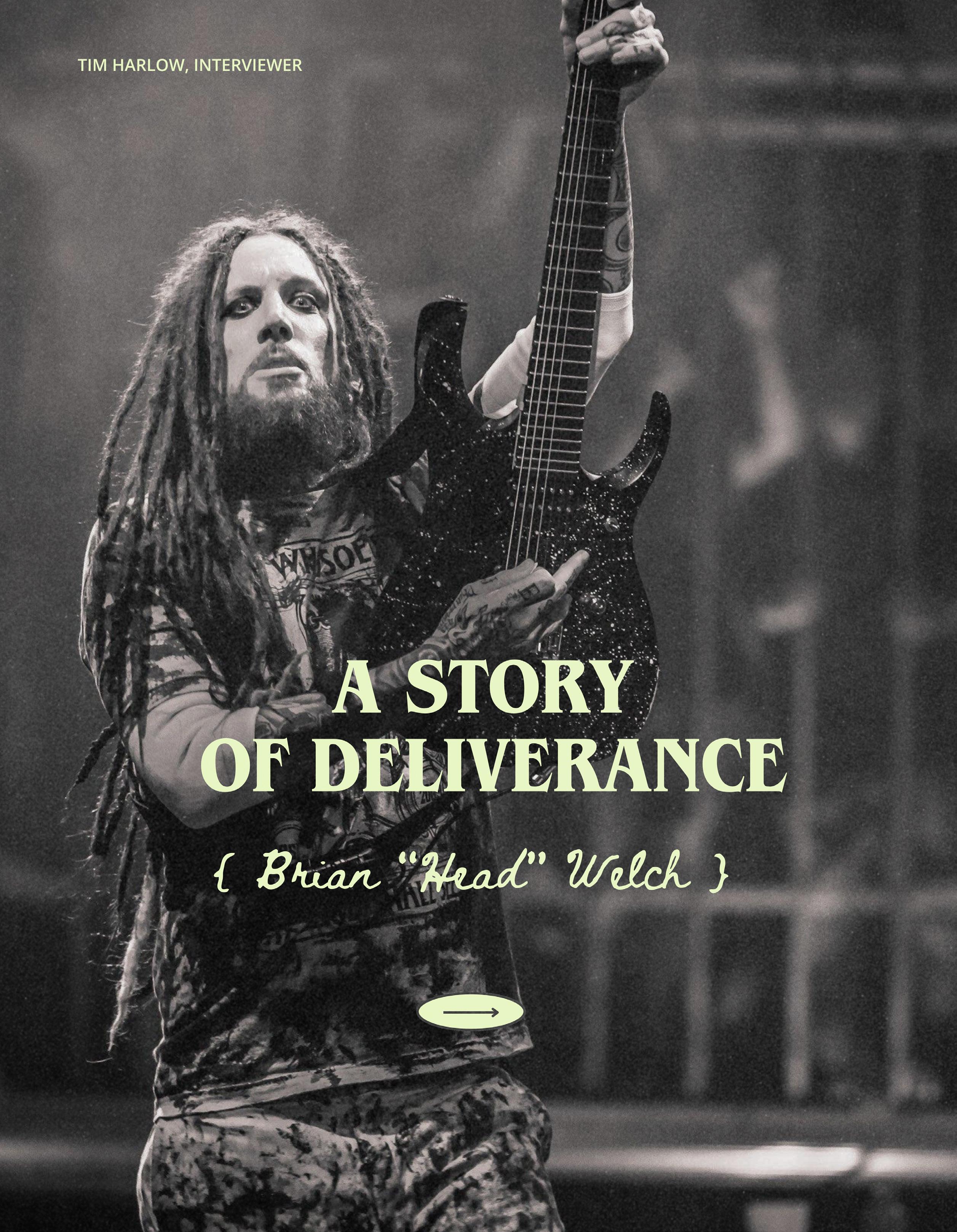
Editor’s Note: As president of the 2014 North American Christian Convention, Tim Harlow, senior minister with Parkview Christian Church, Orland Park, Illinois, interviewed Brian “Head” Welch, guitarist and founding member of the nu metal band Korn. Welch’s story is a testimony to God’s mercy and grace, leading him from Satan’s darkness into God’s light. This transcript of the interview has been edited for length and clarity.
Harlow: Walk us through your journey of becoming a rockstar. You were a parent, you were married, and you were trying to do everything at the same time.
Welch: Let me back up. When I was getting ready to enter high school, this kid named Kevin lived in my neighborhood. He told me about Jesus. His mom told me about Jesus. I hung out with them all summer. They were the nicest family I’d ever met. So, I became a Christian the summer before high school and I think Jesus was setting me up. He knew how much of an idiot I was going to be for the next 20 years. He must have thought, “I’d better put a hook in him now so I can reel him back right at the last second.”
But I also started drinking in high school. I started and didn't stop. I started at 15 and drank for 20 years. Then I started messing with drugs. So when Korn came along, it was just like, “Here's free beer and we’ll pay you to play your music. And here are some Doritos for your dinner.” So, it was more beer and more drugs, and it just got worse and worse. And the party got darker and darker. It was fun at first. I was young and dumb. But then it felt like medicine. I had to do it to feel normal. So, I—and everyone around me—spiraled out of control.
It's crazy, because only in rock and roll can you be a loser and still keep climbing to the top. I don't understand how it worked, but we kept climbing. As my soul fell deeper and deeper into destruction, I was climbing professionally. But inside I was crumbling. I hated the person I had become. That happens to most rock stars at some point along the way. I could count on one hand the rock stars I knew who had strong marriages and weren't drug addicts.
Harlow: I understand you were addicted to prescription medication as well, and that you were taking 17 Vicodin just to get through a single day. How did that even work?
Welch: I really don’t know. And I've heard worse stories than that. It was just crazy. I did that for more than six months. Finally, I did my own rehab and just stopped. I got past it. But after that I got into methamphetamines and that wasn't as easy a habit to break.
Harlow: So, at some point you realized your marriage is a mess and you've got a daughter. Tell us about the driving factor that made you say, “I’ve got to do something different with my life.”
Welch: The first bomb came into my life when my wife left me. I was on tour with Metallica, the biggest band in metal. We were on top of the world. And my wife spun out of control. I was doing meth on tour, and when I'd come home, we'd do it together. Then we'd swear we wouldn't do it, and we were apart. We had a baby, and that's just not the right thing to do. But when you're an addict, that's what you do. Then one time I left for tour, and she kept using drugs. She ended up connecting with a skinhead gang and invited them to come live in our house with my child. She had a boyfriend and he was in my house, and I almost committed murder.
I found out what was going on. I heard rumors that the skinheads were stealing my stuff out of my house. So I started talking to real gangsters, people I could hire to start a war with these guys. But the guy I met with said, “Brian, if you cross that line, you can never go back.” So, I thought about it and realized that's not me. I didn’t want to put a target on my-

self or my daughter. So, I just let it go. My marriage fell apart and my wife left. I gave her a large sum of money. She said she was going to go to court and get half my money and I threatened to kill her if she did, because money was like a god to me.
So, I said, “I'll give you $800,000 to walk and I don't want to hear from you again.” She took it and—I'm just being honest here—I'm not proud of what I did. But she took it, and I became a single dad because my ex-wife was too messed up to show up in court. So, I became a single dad. I tried to get it together for the next few years and I just couldn't. I didn't have God in my life. I was trying to do it by willpower and that didn't work.
Harlow: So how did you reconnect with Jesus?
Welch: This guy asked me to church. He built monster trucks, and he was just a normal guy. His family was awesome. They reminded me of the family that I hung out with when I was a kid. They did stuff together and they were happy, and the spirit of God was there.
So I ended up going to church with him and I recommitted my life to Christ. I went home and I said, “Jesus, you’ve got to help me or my daughter's going to have a dead dad. Just clean me up.” And I'm telling you, ever since that encounter, I've been with Christ. It was like a Paul thing where he was killing Christians and all of a sudden a light shone, and he was changed. I had an encounter with God's love. Eternity filled the room. I felt like I was home for the first time in my life. To be honest, that was the highest high I've ever felt. It was pure and real and forever. It was like, “I’m home, God.” And I’ve been with him ever since.
Harlow: Tell us about your Jesus story.
Welch: After I was saved, I didn't shave for a while. I went to a store one day and a group of kids saw me and said, “Hey, it’s Jesus!” It was funny, but I liked it. I kept the beard for quite a while.
So, my church invited me to go on a trip to Israel. They said somebody backed out and I could transfer their ticket. So, I went. At one point during the trip, my pastor gave me a robe and said, “Wear this robe, Brian.” And I put it on. I was just playing the role of Jesus, but at the same time, inside, I was head over heels in love. God was spoiling me. He was holding me the whole time in his heavenly arms. I thought to myself, I don't care what I look like, I don't care about anything. I was just enjoying it.
Harlow: So you were convicted, and you decided to leave Korn. You turned down a $23 million contract. You gave yourself time to figure out what God wanted for you. Then you returned to Korn. Some people who heard that were saying, “Well, Korn doesn’t exactly sing about Jesus.” So how does that work? Tell us about what's going on now and what God's doing with the rest of your life.
Welch: Well, I went back, and I'm still praying that people will understand. I raised my daughter. The little angel was five when I left Korn. And when I went back to Korn, she was 14. Everything worked out according to God’s plan. The circumstances were right. There were things I couldn't do any longer, and things I didn’t want to see my friends doing. In time, everybody cleaned up and had new families. We became a bus full of Christians—my whole crew. They called us the holy rollers and we prayed for people as much as we could.

For example, we went to Australia on tour and we were praying, “God, reveal the hearts of people to us.” One day I stepped outside of the hotel and a guy came up to me and said, “Hey man, I've been a fan forever.” I said, “Let me pray for you.” He started crying right there. We became friends. From that point on, we made friends everywhere we went. It’s just crazy what God does.
We’re still in the middle of a lot of partying. I’m on tour right now with Avenged Sevenfold and Ice-T. We’re right there in the mix and everyone knows what we stand for. God has placed Christians in all these bands, and we all meet in a bus and do Bible studies and talk about why we're there and what we're doing there.
I’ll have to say I didn't see this coming. I was out of the music scene for at least eight years. I was trying to stay in the shadows, but God was pushing me back there. I felt like he was saying, “I want to restore your relationships with your friends and your fans. I want to restore you in every way.” And he's been doing that.
Paul said he became all things to all men so that he could win some. And I know people out there are saying, “Man, you're in an evil environment.” But isn't that what we're supposed to do? We’re supposed to be light in the darkness. If we keep to ourselves all the time, what good is it?
Most people know my heart. I could leave Korn tomorrow and be a missionary. I don't care where I am. I don't know how long I’ll keep doing this, but I know I'm called to it. I have the grace to be here. I have the strength, I have the accountability, and I'm called to it—for however long this season lasts.
Harlow: You needed some time to raise your daughter, to get your head together, to grow in Christ, and to get ready to go back in there. I think that's important. I talk to people about getting out there and going to the places Jesus would've gone out to, going out to where the sinners and the tax collectors are. But there is a sense in which you've got to know what you can handle, and you've got to have your Christian people around you or you're going to fall right back into it.
Welch: I couldn't have handled it right away, but year by year, God was preparing me. He was strengthening my soul every year until I got to the right place. That’s when I could hear him telling me to go.
Harlow: Ten million people follow you guys on Facebook. That’s an impact you're able to have that none of us has. Jesus brought you out of that and he's brought you back into it.
I’d like to pray for you as a missionary to rock and roll right now. Lord God, I thank you so much for this man. He is a hero to so many young people. You’ve given him the opportunity to minister to people in ways none of us can. We commission him right here as a missionary from the Restoration Movement to the world of rock and roll. And we ask you to watch over him and his daughter. We pray for his wife. We pray for the people who will attend his concerts, who will hear him, and get a chance to know him, and find out who he is. People who might then search out his testimony and find out that this guy is the real deal. Bless him and keep him safe. And Lord, let him be the light in the darkness that none of us could ever possibly be. We ask these things in Jesus. Amen.

A Christian Counselor’s Perspective
Doug Spears, Ph.D., LPCC/s
Mental health challenges are a significant concern in today’s world. For Christians, understanding the connection between mental health, mental illness, faith, and spiritual warfare is essential in navigating difficult times. This article explores these connections, examining how spiritual warfare influences mental health and how believers can confront these challenges through biblical wisdom, insight, and compassionate care.
Mental health refers to a person's emotional, psychological, spiritual, and social well-being. It influences how individuals think, feel, behave, handle stress, relate to others, and make decisions. Like physical well-being, mental health is a crucial aspect of holistic health. Mental illness, by contrast, is a health condition that affects a person’s thinking, emotions, behavior, or ability to function in daily life. It can range from mild to severe and may be temporary or chronic. These conditions are influenced by biological, psychological, social, and spiritual factors.
As described in the Bible, spiritual warfare refers to the ongoing battle between good and evil, particularly how sin, spiritual oppression, and demonic influences can impact a believer's mental, emotional, and relational well-being. A biblical understanding of mental health and spiritual warfare enables Christians to discern between psychological struggles and spiritual attacks, providing them with effective tools for resistance and spiritual growth.
We are witnessing a shift in cultural perceptions that can be understood through two concepts: "error change" and "error connection." These terms, borrowed from technology, illustrate a lack of connection and misalignment in contemporary society. Error change refers to identifying errors in thinking, behavior, or decision-making and actively working to correct them. Error
connection highlights how errors are interconnected, revealing how one mistaken belief or pattern of thinking influences another.
This cultural shift has been accelerated by the impact of the pandemic, leading to an "infodemic" (the overwhelming spread of conflicting information) and a "technodemic" (the increasing distraction caused by technology). However, the distortion of truth and disconnection from the divine order is not new; it dates to Genesis 3, where humanity first chose rebellion and idolatry.
The events in Genesis 3 illustrate the first instance of an error connection, where deviation from God’s truth leads to catastrophic consequences. The serpent manipulated Eve through deception, introducing doubt and fear. His strategy was not to enlighten but to sow confusion, leading humanity away from God's presence. Genesis 3:6 indicates a collision of temptations that were involved in the fall. Lust of the flesh, lust of the eyes, and boastful pride of life (1 John 2:16).
Satan’s goal has always been to dethrone God and deceive his image bearers. He targeted Adam and Eve because their choices would shape all future generations. This pattern of deception—planting doubt, fostering fear and temptations, and leading to distorted perceptions of God—continues today. It manifests in modern struggles such as anxiety, depression, and spiritual disconnection.
One of the enemy’s primary tactics is to shift our focus away from God, whispering subtle lies that cause us to doubt his goodness and seek fulfillment elsewhere. This leads to idolatry, where we replace God with material possessions, desires, or coping mechanisms. The result is spiritual and mental fragmentation, making individuals vulnerable to both psychological distress and spiritual attacks.
spiritual & psychological factors often overlap.

The Apostle Paul describes spiritual warfare in Ephesians 6:12: “For our struggle is not against flesh and blood, but against the rulers, against the authorities, against the powers of this dark world and against the spiritual forces of evil in the heavenly realms” (New International Version). Spiritual warfare affects mental health in several ways:
• Confusion and False Teachings. Satan attacks the mind with false teachings and deceitful philosophies (2 Corinthians 2:11, Ephesians 6:11).
• Intrusive Thoughts and Temptations. Unwanted thoughts contradicting God’s truth can lead to self-doubt, anxiety, and despair (John 13:2).
• Oppression and Discouragement. Persistent negative thoughts and feelings of hopelessness can weaken faith and lead to spiritual stagnation (1 Peter 5:8).
• Strongholds. Patterns of sin, addiction, and destructive behaviors create mental and emotional distress, as described in 2 Corinthians 10:4.
Christians must exercise discernment in addressing mental health issues, recognizing that spiritual and psychological factors often overlap. Some mental struggles may stem from spiritual warfare, while others may have psychological or biological roots. A biblical approach includes:
Renewing the Mind with Biblical Truth: Romans 12:2 urges believers to be transformed by the renewing of their minds. Many mental health struggles stem from distorted thinking patterns, which can be countered with biblical truth. The power of truth (Ephesians 6:14) defends against deception. The role of the Holy Spirit guides believers in righteousness (Romans 8:13-14). Guarding against spiritual openings (Ephesians 4:27) prevents spiritual strongholds.
The Power of Prayer and Deliverance: James 5:16 calls for confession and intercession for healing. Deliverance through Christ can break strongholds and restore spiritual freedom.
The Role of Community and Accountability: Isolation weakens believers spiritually and emotionally. Proverbs 27:17 reminds us, "As iron sharpens iron, so one person sharpens another." Support and encouragement help in spiritual and mental struggles. Accountability aids in resisting temptation and renewing faith. Healing relationships counteract isolation and despair.
Integrating Faith with Compassionate Care: Christians should blend biblical wisdom with pastoral care, focusing on renewing thought patterns (Philippians 4:8) and transformation of the mind (Romans 12:1-2).
Spiritual Disciplines as Mental Health Tools: Practicing spiritual disciplines builds resilience against mental, emotional, and spiritual distress. Scripture Meditation renews the mind. Prayer and Fasting strengthen dependence on God. Worship and Gratitude refocus the mind on God’s sovereignty.
Mental health and spiritual warfare are closely interconnected. Christians play a vital role in merging faith with compassionate care, fostering holistic healing. By understanding the spiritual and psychological aspects of mental health, applying biblical truths, and exercising wisdom, Christian caregivers can help individuals find freedom, healing, and renewed hope in Christ.
As believers, we are called to walk in wisdom and spiritual authority, recognizing that Jesus has already achieved the ultimate victory. Through faith, prayer, and compassionate care, Christians can guide individuals through the battles of the mind and spirit, leading them toward the abundant life that God intends for them.
Dr. Doug Spears is a licensed clinical counselor and dean of the Russell School of Ministry (Central Christian College of the Bible) in Moberly, Missouri and Florence, Kentucky.

BY GINNY MCCABE
Ben Alexander was an amazing man of God. He traveled the world sharing the gospel, touching millions of people across the globe. The late Alexander, an internationally renowned evangelist and founder of Exposing Satan's Power (ESP) Ministries, came out of a spiritualist background in England. Later, he came to the United States and devoted his life to Christ, warning Christians about the dangers of the occult.
Exposing the work of Satan while sharing the good news of God’s mercy and grace, Ben preached in churches, spoke at conferences and conventions, and met personally with men and women trapped in the occult. In addition to his autobiography, Out from Darkness, Ben created and published numerous video lessons and online messages, appearing on programs like CBN’s “700 Club” and Dr. James Kennedy’s “Truths That Transform.”
In 2001 Ben was featured in a multi-part documentary produced by Christian Kingdom College, Winchester, Virginia. Radio co-host Charles Doughty introduced Ben to their audience with a simple but accurate summary of Ben’s life and ministry: “We have with us in our studio a very interesting man, a former spiritualist from England, now an evangelist and Christian author, brother Ben Alexander. He’s my brother in Christ. He loves the Lord, and he loves New Testament Christianity; but it hasn’t always been that way. He’s had a hard, rocky road to the cross of Calvary.”
What makes Alexander’s story so powerful is that he experienced many of the things he spoke about firsthand. He was born on December 25, 1920, to a widow named Golda Alpern, who gave him up for adoption immediately. He grew up in London and was raised in the Jewish faith by adoptive parents. His only sibling, his brother, Morrie, was also adopted. Both his mother and father passed away before he was 18. Through a series of tragic events, which began at a young age, Ben immersed himself in spiritualism.
At age 11, he remembered being awakened by the screams of his father, who was crying out, “Please, God, don’t let me die. I don’t want to die, God. Help me!” Alexander said he was terrified when he heard those words. He recalled, “I can never forget what happened that night. It was in the early hours of the morning that I believe the seeds of spiritualism were sown. [It was] the fear of death.”


Ben believed his father’s fear of death had much to do with the way he lived. Ben observed, “Why was [my father] afraid? Well, he lived like so many men live today as if they have a thousand years to live. For starters, he was a wife-beater. He was always beating my mother. She always had black and blue eyes, and bruises all over her face and body.”
In addition, his father was having an affair with the woman next door. She gave birth to a child who looked just like his father. Now the time had come, he was about to die, and he could only scream in fear.
In the early hours of the morning, they took Ben’s father to the hospital. A few hours later they brought him back in a closed coffin which was placed in the middle of the living room. Ben wasn’t aware of what was going on until he woke up the next morning, noticed that the furniture had been moved, and saw the coffin.
“I knew it was him, and I was literally terrified when I saw this. It was awful. Terror struck my heart,” Alexander said. At the time, he also remembered talking to God, saying, “Please, God, don’t let me die. I don’t want to die, God.” He was frightened. He hadn’t been taught anything about life after death.
Alexander attended a Hebrew school several days each week after public school. There he learned a few traditional prayers along with the Ten Commandments. He was also taught that he could fast once a year and he would be forgiven for his sins. So, the idea of death struck his heart and frightened him.
Sadly, Ben’s parents never told him he was adopted. He learned the truth indirectly. “They never told me they adopted me. The neighbors told me, and I did find a document,” Alexander said.
The Alexander family lived in a two-room home in the slums of London’s East End. After Ben’s father died, his mother felt she had no way to provide for her family. “My mother was a very illiterate woman. We were very poor, and when [my father] died, there was no money coming in, and she couldn’t earn a living. So, she turned to prostitution. These were very traumatic times for me, because as it was, where I lived was a red-light district, anyway,” he said.
Over the next seven years, Ben grew more introverted and ashamed. At the age of 17, another trauma took place in his life. His mother died. She died in the hospital of bronchopneumonia and was buried the same day. Three days later, Ben had a vision of his mother, appearing in front of him. Although he said he didn’t know it at the time, he was seeing an “apparition,” a ghost or ghost-like image of a person. He said his mother was a fortune teller as well, not as an occupation, but as entertainment.
In his autobiography Ben shares story after story of how he went from darkness to light, and how he not only came to know Christ personally but became a Christian evangelist and popular author devoted to warning others of the reality and dangers of spiritualism.
Eventually Ben quit school. He bounced around from the military to the tavern. He drove a cab. He drove a bakery route. He experimented with life and that experimentation took him into the pits of hell. During that time, he became one of the leading spiritualist activists in London. His passion for the occult led him to the United States for the purpose of spreading spiritualist activity throughout the country.


When Alexander arrived in America, his soul was tormented. “I felt like a fugitive. Fear of death, hopelessness, and guilt seemed to be my lot,” he said. However, during his first year in the U.S., he was introduced to Christianity through the love and kindness of the Huntsinger family.
“It was a long drive from Santa Monica to Norwalk on Sunday, February 14, 1965,” Ben wrote, “but it turned out to be the most important day of my life. I sat in the service and listened to the minister, whose name was Orrin Kingsriter. This was the first time that I had ever actually attended a worship service.”
When the service ended, members of the church came to him and warmly welcomed him. He had never experienced this kind of care and concern before. Alexander tells how Kingsriter and the people at the church prayed for him, shared Scriptures, and ultimately led him to Christ.
After living in darkness for so long, Ben became a light for Jesus. He grew passionate about sharing the story of his personal transformation. He frequently traveled to Christian conferences, churches, and missionary events, and was interviewed on thousands of radio and television programs. His expertise was rooted in sound biblical truth, and he touched millions of people’s lives.
In his endorsement of Out from Darkness, teacher and author Knofel Staton wrote,
I know of no single man who is more courageous, faithful, open to grow, and flexible as Ben Alexander. Although he is well known and in demand, he is willing to take a telephone call from anyone and spend hours on the phone with that person. He has made himself continually available and accessible. Ben Alexander never meets an unimportant
person, nor encounters an unimportant issue in that person’s life. He literally pours himself into people and allows people to pour themselves into him.
Staton added that his greatest takeaway from reading Ben’s autobiography “is knowing the Christ, who changed Ben Alexander and who uses him.”
Ben was 50 years old when he and his wife, Miranda, founded Exposing Satan’s Power Ministries. In the decades that followed, the two were constantly on the go, speaking across the country and counseling individuals. Their ministry continued for nearly 50 years until Ben’s death on February 19, 2018.
The core of the ministry’s message has been to warn against Satanism and the occult and to tell others about the transforming power of God’s love. Alexander said many times in his talks and interviews that young people are often introduced to the occult through seemingly harmless avenues such as the Ouija board, Dungeons and Dragons, and fortune tellers.
“Praise the Lord, I found the light. That realization of that first taste of Christianity brought refreshing hope and chased away the darkness in my life. I discovered I was loved,” Alexander said in the book.
Exposing Satan’s Power Ministries continues through the ministry website, www.espministries.com. Ben’s lectures and lessons are available as YouTube videos on a variety of topics from abortion and astrology to the powers of darkness and wicca.

By Christopher L. Reese

Christians hold various opinions about Halloween, but one thing it certainly points to is the human fascination with the supernatural. Although many in the West pride themselves on being secular and scientific, everyone has an innate curiosity about what may lie beyond the world we experience with our five senses. History shows humans have always acknowledged the existence of the supernatural and engaged in practices to worship or manipulate it.
This is unsurprising in light of the fact that humans are spiritual beings (e.g., Matthew 10:28), and that we interact with the spiritual realm— for example, by entering into a relationship with God, who is also spirit (John 4:24). The author of Ecclesiastes tells us that God has “set eternity in the human heart” (Ecclesiastes 3:11), and Augustine echoes this when he writes, “You have made us for yourself, O Lord, and our heart is restless until it rests in you.”
Although humankind should seek transcendence in God, because of the fall, many seek it elsewhere. If one is coming into contact with the spiritual realm apart from God, they are interacting with the only other spiritual reality that exists, that of Satan and his demons—the world of the occult.
What C. S. Lewis perceptively wrote about demons also applies to the occult in general: “There are two equal and opposite errors into which our race can fall about the devils. One is to disbelieve in their existence. The other is to believe, and to feel an excessive and unhealthy interest in them.” In the same way, it is a mistake either to deny or underestimate the reality of the occult, or to spend a great deal of time and energy dwelling on it (unless one is called to a ministry that requires deeper engagement). Yet, since the occult is prevalent in the world, we should be aware, at least, of the main forms that it takes. As Paul wrote, “we are not unaware of [Satan’s] schemes” (2 Corinthians 2:11).
The occult can be defined as “[Phenomena], events, and religious practices engaging a practitioner in a realm of the supernatural that is rooted in things secret or hidden.” More specifically, “The term frequently refers to certain practices (occult ‘arts’) that include divination, fortunetelling, spiritism (necromancy), and magic.”
The U.S. government doesn’t keep detailed records on religious affiliation, so precise numbers of occult-oriented religions aren’t available. But the Pew Research Center’s 2014 Religious Landscape Study estimated that 0.4% of the U.S. population, about 1.3 million people, subscribe to a “New Age” religion, with most of these identifying as Wiccan or Pagan. By comparison, the Presbyterian Church (USA) has about 1.2 million members.
In 2007, an executive with Barnes & Noble estimated the American “Pagan Buying Audience” as numbering 10 million people.
Since the largest occult-oriented groups cited in the Pew survey above consist of New Age and Wiccan or Pagan adherents, we’ll examine the beliefs of those groups below, followed by a brief discussion of some of the most common occult practices. There is a tremendously diverse spectrum of beliefs among both New Agers and Pagans/Wiccans, so the following survey attempts to identify the beliefs most commonly shared by these respective groups.
The New Age Movement is a “loosely structured network of individuals and organizations who share a vision of a new age of enlightenment and harmony . . . and who subscribe to a com-
mon ‘worldview.’” As with Wiccans, there is a vast array of beliefs among New Agers (though many don’t necessarily identify with this label). Despite the diversity of beliefs, there are some commonalities, including the following.
• An emphasis on personal experience and mysticism rather than dogma.
• A belief in monism (all reality is one) or pantheism (everything is God).
• Adoption of beliefs from a variety of world religions and/or mystical traditions.
• Rejection of the idea that any single religion or belief system is exclusively true.
• Humans are divine and don’t need salvation, but enlightenment, which involves embracing one’s true divine identity.
• A belief in the sacredness of the earth, which is sometimes viewed as a living organism.
• Belief that humans can bring about a utopia through enlightenment and personal transformation.
• There are various organizations devoted to New Age beliefs, but most adherents engage in spiritual practices alone, or with a small group. Popular practices include astrology, the use of crystals (for meditation or healing), the pursuit of altered states of consciousness (sometimes using hallucinogenic drugs), attempting to interact with spiritual beings (through mediums or channeling), and the use of psychic powers to gain knowledge beyond the five senses.
Paganism is an umbrella term that encompasses modern attempts to revive pre-Christian religions (such as Greek, Roman, and Germanic), but mostly
consists of those who identify as Wiccans (witches). There is no centralized Wiccan teaching authority, or set of beliefs that all adherents agree to, but the following are generally applicable.
• An emphasis on practice and personal experience rather than dogma.
• Belief in gods and goddesses, or pantheism (everything is God), or panentheism (everything is part of God), or animism (everything possesses a spiritual essence), or a combination of these.
• Most Wiccans deny the existence of Satan.
• Humans are basically good and divine, or potentially divine. Sin as defined by Christianity does not exist, but one can be in disharmony with oneself, others, or supernatural beings. Since there is no sin, salvation isn’t necessary.
• All living things are sacred.
• Magic (sometimes spelled with a “k” [magick] to distinguish it from tricks performed by illusionists) can be used to bring about change in people and the world, and can be used for both good and evil purposes.
• Many Wiccans believe in some form of reincarnation.
• Many Wiccans celebrate eight Sabbats (festivals) throughout the year, and perform rituals either privately or with other Wiccans. Some Wiccans meet in small, autonomous groups called covens.
Of these two groups, New Age beliefs are far more popular and prevalent in the U.S. Many of these ideas have taken root in popular culture and are promoted by celebrities, movies and TV shows, music, and bestselling books.

Necromancy refers to the attempt to contact the spirits of the dead in order to obtain otherwise hidden knowledge or to communicate with deceased relatives or friends, often for the purpose of emotional comfort or closure. Mediums claim the ability to act as a bridge between the living and the dead, and the attempt to contact spirits is sometimes called a séance (from the French word for “session”).
Divination is the attempt to gain knowledge of future events or other hidden knowledge by interpreting signs, contacting spiritual entities, or through supernatural powers. Divination has been practiced throughout human history and is still prevalent today. Modern forms include the use of tarot cards, psychic readings, astrology, palm reading, and Ouija boards.
Magic can be defined as the use of rituals or actions performed for the purpose of manipulating natural or supernatural forces or beings. Both necromancy and divination can be considered forms of magic, as well as the casting of spells, which often involves incantations, physical rituals, and the use of herbs, potions, or amulets.


First, occult beliefs and activities are an attempt to circumvent God’s authority and go beyond the revelation provided in Scripture. This temptation is as old as humankind itself and was precisely what Satan offered Adam and Eve in the garden. Satan insisted that there was knowledge to be had that God was withholding and that gaining this knowledge would elevate the human couple to a godlike status (Genesis 3).
In this light, it’s not surprising that Paul refers to false teachings as “things taught by demons” and that some who abandon the faith “follow deceiving spirits” (1 Timothy 4:1). Much of Satan’s activity in the world involves producing and disseminating ideas that contradict or distort God’s revelation.
The occult is also a form of idolatry, giving ultimate allegiance to someone or something other than God. Whether it’s the Mother Goddess worshiped by some Wiccans or a deified self pursued by New Agers, all occult belief systems replace the Creator who has revealed himself in Scripture with some type of counterfeit deity.
In addition, all of the categories of occult activities noted above (necromancy, divination, and magic) are expressly prohibited in Scripture. As the Lord warned the Israelites before they entered the promised land:
Let no one be found among you who sacrifices their son or daughter in the fire, who practices divination or sorcery, interprets omens, engages in witchcraft, or casts spells, or who is a medium or spiritist or who consults the dead. Anyone who does these things is detestable to the
Lord; because of these same detestable practices the Lord your God will drive out those nations before you (Deuteronomy 18:10-12).
We are all tempted to try to discover what will happen in the future or to gain other knowledge not attainable through natural means.
But as the late biblical scholar Merrill Unger pointed out:
There is everything wrong in prying into the future, which God has not revealed and, for our own welfare, does not want us to know. Such knowledge is contrary to God’s Word and will, but it is the kind of knowledge that Satan and demons give.
. . . Although God has revealed his general plan for the future for both the saved and the unsaved, it is not normally his purpose for us to know the specifics of that plan or the details of individual lives.
Thus, Moses told the people of Israel, “The secret things belong to the Lord our God, but the things revealed belong to us and to our children forever” (Deuteronomy 29:29).
Finally, participation in occult activities opens a person up to demonic influence. This is true for both Christians and non-Christians. Paul warned the Corinthians that “the sacrifices of pagans are offered to demons, not to God, and I do not want you to be participants with demons. You cannot drink the cup of the Lord and the cup of demons too; you cannot have a part in both the Lord’s table and the table of demons” (1 Corinthians 10:20-21).

necromancy, divination, and magic are expressly prohibited in Scripture.

The following six steps (based on Patrick Zukeran’s, “The World of the Occult: A Christian Worldview Perspective,” Probe Ministries (blog), May 27, 2003) are crucial for anyone who desires to break free from the occult.
1. Receive Christ as your Lord and Savior: The first step in departing from the darkness and entering the light is to be born again into God’s kingdom through Jesus’ sacrificial death on the cross for your sins. Those who come to Christ are “called . . . out of darkness into [God’s] wonderful light” (1 Peter 2:9). One of the reasons Christ died was “so that by his death he might break the power of him who holds the power of death—that is, the devil—and free those who all their lives were held in slavery by their fear of death” (Hebrews 2:14-15).
2. Confess the sin of involvement in the occult: Scripture declares that “If we confess our sins, [God] is faithful and just and will forgive us our sins and purify us from all unrighteousness” (1 John 1:9).
3. Destroy all occult objects: The book of Acts describes how many who had practiced sorcery in the city of Ephesus came to Christ and “brought their scrolls together and burned them publicly” (Acts 19:1819). Zukeran notes, “Having occult items around such as game boards, cards, and statues may provide a source of temptation to return. Removing all such objects helps avoid facing that temptation and dealing with memories.”
4. Break off all occult associations: Communication with spirits (which in reality are demons) must cease, and you must no longer associate with friends or others who remain involved in the occult. Seek out new friends who are mature Christians who can help you grow in your relationship with Christ, and find a Bible-believing church where you can worship and serve.
5. Immerse yourself in God’s Word: As Paul instructed the Christians in Rome, “Do not conform to the pattern of this world, but be transformed by the renewing of your mind. Then you will be able to test and approve what God’s will is—his good, pleasing and perfect will” (Romans 12:2). Our minds are transformed as we read, study, meditate on, and memorize God’s Word. Scripture is also the “sword of the Spirit” by which we repel Satan’s attacks (Ephesians 6:17; see Jesus’ example of doing this in Matthew 4:1-11).
6. If necessary, seek additional help: If you find yourself struggling even after following the steps above, find a Christian counselor or minister to talk to, especially someone who has experience helping people formerly involved in the occult.
Excerpted from the original article first published in The Worldview Bulletin Newsletter (worldviewbulletin.com) on October 3, 2024.
Christopher L. Reese (MDiv, ThM) is a writer, editor, and journalist. He is the founder and editor
The psalmist articulated the union of truth and love beautifully: “Lovingkindness and truth have met together: Righteousness and peace have kissed each other” (Psalm 85:10, New American Standard Bible).
The union of truth and love has too often been presented as a simple balance or a mixture: for example, “She’s a little too high on the truth scale,” or conversely, “She puts too much emphasis on love.” However, you can’t have too much love, and you can’t have too much truth. Truth doesn’t need a little falsehood to soften it, nor does love need a little hate to toughen it.
Truth and love are not opposites. They are not mutually exclusive. You can apply or demonstrate either of them incorrectly. Certain demonstrations of love or truth aren’t appropriate for the time and place, but there is never too much of either. Both are eternal.
Both are the essence of God. Both are an integral part to the other’s definition. When we speak the truth in love, we are the most faithful to our own plea. Let there be no doubt that learning the union of truth and love is at the heart of restoration.
WHERE AUTONOMY & ACCOUNTABILITY COOPERATE
One of the most beneficial characteristics of our DNA is congregational autonomy. We employ a plurality of local leaders who guide, shepherd, and strategize in faithfulness to the charge given them by God. No outside interference or mandatory, man-made, external structures and controls should hinder our quest. However, that great design can be corrupted
when isolation and insulation become the standard way of operating. When congregations and leaders network, fellowship, and learn from each other’s successes and failures, and when we cooperate for kingdom advances, an environment for true restoration of New Testament Christianity can occur.
WHERE ANCIENT PATHS & PRESENT CULTURE ENGAGE CORRECTLY
The “ancient paths” mentality of Jeremiah 6:16 remains a foundation for Restoration principles. Jeremiah wrote, “Stand by the ways and see and ask for the ancient paths, where the good way is, and walk in it.” When we insist that the eternal wisdom and plan of God is never archaic or outdated, and yet we fearlessly engage with the realities of our contemporary society, we can find optimum relevance and effectiveness in engaging our culture. When those two worlds are bridged, without compromise, the church shines.
WHERE THEOLOGY & MISSION MERGE
We tend to think of purists and pragmatists as inhabiting opposite ends of the spectrum. That can be an accurate assessment. But the real restoration of New Testament Christianity begins with the realization that ministry and mission are the outworking of our theology. From the Greatest Commandment to the Great Confession to the Great Commission, our professions and practices must align and be consistent to help us become the great congregations God intended.
These are wise words from Jeff Faull! At The Solomon Foundation, We value independence because it boosts our confidence, makes us less reliant on others, reduces our stress, promotes our happiness, gives us freedom, provides a sense of accomplishment, helps us make better decisions, promotes personal improvement, boosts creativity, broadens our horizons, and builds our self-esteem. It’s a good thing!
But while independence is a good thing, it’s not the only thing. There is such a thing as healthy dependence. A good marriage or family illustrates that. We complete each other by having strength where the other might be weak. It lightens our load, we learn more, collaboration increases our effectiveness, it improves our relationships. We don’t have to be alone! It’s a good thing!
What is true for us individually is also true for a church. Independence is a good thing. Imagine being forced to go to a church that was teaching and promoting serious things that you didn’t agree with. Imagine being in a church that wasn’t allowed to teach what it felt was critical and true because you were not allowed to. Imagine being forbidden to establish such a church or gather with likeminded people. In much of the world this is not a matter of imagination. Inside of many denominations, it can feel the same way. A local church has a very different view from the denominational hierarchy but is prevented from exercising that belief. An independent church doesn’t contend with those things. Being independent is a good thing!
But should it be only independent? Where is the love in that? Where is the accountability? Where is the connection with culture? Where is the mission?
Just like people, we need healthy dependence in the church as well. It’s critical to our success. Without it, we can grow inward and cold to the outside world,
making sure we take care of our own but no one else. We can get isolated from our culture, no longer able to communicate and impact others. We can lose our humility without accountability and consider ourselves exceptions instead of examples. The whole book of 3 John is about what the wrong kind of independence can look like.
Most of the books that make up the New Testament are letters to independent churches. The letters prove just how much they needed each other’s examples and careful instruction. The Corinthians needed to come together as a church and grow up (1 Corinthians 3:1-9).The Galatian and Colossian churches needed to stop their legalism and be reminded about the simplicity of trusting in Jesus alone. The Philippian and Thessalonian churches needed encouragement in suffering and opposition. The Ephesian church was an incredible example to the others. The Roman church was reminded that we’re all the same and in need of the same Savior. The book of Revelation visits 7 churches that need encouragement and adjustments. Having a healthy dependence on each other is also a good thing.
So maybe the best word is interdependent. It means independent but not isolated, autonomous but accountable, unwavering in truth but relevant to culture, committed to our personal walk but consumed with a desire to share the relationship. That isn’t just a great idea for the church, it’s a great one for us!
The Solomon Foundation is a great illustration of interdependence! We receive investments and put that money to work to build churches—to build the kingdom—all while giving a great return on that investment! In doing so, we help to remove obstacles from churches, allowing them to experience their greatest potential. We’d love to be your ministry partner for that same thing today!

‘IT’S NOT ABOUT THE TITLE’


Brady H. Funn III Outstanding! Harris makes the responsibility of leadership plain in the article. It’s not about the title, it’s about the work leaders must put into leading for a church, business, or organization to be successful. [“Is There a Leader?”, by Jerry Harris, March/April 2025, p. 2].
Michael Bratten Vision is a good thing, but so is timing. … Difficult decisions must be made, and part of that involves gauging which roadblocks to growth need to be removed, who will be affected, and how quickly the change can be tolerated.
‘WELL WRITTEN AND WELL SAID’



Kent Odor This was well written and well said! Thank you Karl. . . . I think just helping and allowing those in ministry to be organized in a way that they can truly practice love for one another can go a long way in keeping ministers and missionaries steady for the long haul. [“Facing the Changing Face of Culture,” by Karl Halverson, March/April 2025, p. 36].
Daniel Schantz Very informative and helpful. A lot of things I didn’t know.
Michael Bratten Although you could not list all the reasons for leaders wanting to quit, a big one is staff issues. . . . So much of what goes on behind the scenes can suck the life out of any leader.
‘NEEDS TO BE READ’

David Roadcup Great article by David Vaughn! Needs to be read by every minister and elder in every church. [“Avoiding a Mount Carmel Meltdown,” by David Vaughan, March/April, p. 58].
‘PRACTICAL SUGGESTIONS’

Michael Bratten Great article with practical suggestions. [“Discouraged in Ministry? 10 Ideas from RENEW. org,” by Daniel McCoy, March/April, p. 48].
‘EXCELLENT ARTICLE’


Tim Liston Excellent article, Dr. Curtis. Thanks for sharing. [“When ‘Your All’ Isn’t Enough” by Curtis McGinnis, March/April, p. 12].
Michael Bratten Good job, Curtis. I didn’t remember the story of Asa, so thanks for that. How quickly we tend to “go back to doing it on our own.”
‘RIGHT ON TARGET’

Michael Bratten Great stuff and right on target. I’ve found that honest, hard accountability is so needed in ministry. Thanks! [“The Fuel that Ignites Unbearable Stress,” by Jeff Vines, March/April, p. 52].
‘I


Diane Mitchell When I keep my focus where it should be, every stress melts away.
Loren C. Roberts Thank you pastor Jeff for your candid message and the solutions presented.


‘WE
Loren C. Roberts I pray for Christ’s Church worldwide and that God will provide teaching pastors for each congregation around the world. Also for our local campuses and leaders in my morning prayer time. [“The Uncommon Family,” by Clayton Hentzel, March/April, p. 62].
Michael Bratten Being a good minister of the gospel has never been easy. For that reason the passion and commitment must be present, continual, and not just something of one’s past. Great suggestions!

‘CHURCH

Loren C. Roberts Yes, we do need to hear the same gospel over and over. Not only to remind the regulars but to enlighten the newcomers. [“The Power of Repetition,” by Chris Philbeck, March/April, p. 26].
Vernon Thiede The problem today is that American Church Goers just want to be entertained while they fake their way through their faith. Who wants to pastor souls like that? [“The Challenge and Hope of Vocational Ministry,” by Shawn McMullen, March/April, p. 6].
‘TIMELY, ENCOURAGING ARTICLE’


‘THANK

Bryan Sands Thank you, Alan and Ken, for your years of faithfulness! This was a timely, encouraging article for me! [“Staying Strong in Ministry Leadership,” by Ken Idleman and Alan Ahlgrim, March/April, p. 68].
Debbie Mitchell All leaders—and their church families—need to read this! Let us be called “replenishers” for our church leadership!
Diane Mitchell Thank you for educating us about this situation. [“Dedication to a Change,” by Laura McKillop Wood, March/April, p. 18].
For space, length, readability, relevance, and civility, comments sent to Interact may remain unpublished or be edited. We do read them all and prayerfully take them to heart. If we publish your comment, we will try to honestly reproduce your thoughts with those considerations in mind. Where we disagree, let’s continue to keep P.H. Welshimer’s words in mind to “disagree without being disagreeable.”
@chrstandard @christianstandardmagazine @christianstandardmagazine cs@christianstandardmedia.com
‘BEAUTIFUL TESTIMONY’
Bob Stacy Beautiful testimony regarding a special teenager who lived for Jesus. I didn’t know Sam, but I’ve known many young people like him through my years of working with teens. How important it is that adults know the hearts of youth. I’ve never known one whose heart was not easy to reach IF you loved him/her and were unafraid to place your own heart out there where those youth could see it and touch it. Look for “Sam” wherever you go. He may be outgoing. He may be shy. But if you look, you’ll find him. [“Recalling Sam Lilley, Church Member and Victim of January 29 Air Tragedy at Reagan National Airport,” by James Thompson, March 4, 2025, https://christianstandard.com/2025/03/recalling-sam-lilley-church-member-and-victim-of-january-29-air-tragedyat-reagan-national-airport/ ].
‘MADE A POINT THAT NO ONE HAS ACKNOWLEDGED’
Bill McKenzie Seems to me Tyler made a point that no one has acknowledged. “Time to go all in on evangelizing the next gen!” . . . . Forget “I like Ike” or MAGA mania. Look at the spiritual revival that’s happening. Young hearts today have a fresh appetite for the truth that will set them free. Jesus saves. That’s a cause that should unite us to fight, fight, fight! [“The Anti-Progressive ‘Vibe Shift’ Happening Right Now in American Culture,” by Tyler McKenzie, March 11, https://christianstandard.com/2025/03/the-anti-progressive-vibe-shift-happeningright-now-in-american-culture/ ].
Jason Carnley Most of the young people interested in Jesus are politically conservative and sick of Woke. You can bend with culture and challenge at the same time. Just keep loving people because most of life really isn’t political.
Loren C. Roberts We place too much faith in mankind and too little in our Lord and Savior.
Eric There is a huge problem with the entire premise of this article. . . . The Overton window has shifted so far to the right, we can no longer objectively talk about these things.
‘I ALWAYS LEARN’
Dr. Alan Zimmerman Thanks Ken. I always learn from your wisdom and experience. [“Navigating Tough Conversations (Part 1),” by Ken Idleman, March 17, https://christianstandard.com/2025/03/navigating-toughconversations-part-1/ ].
‘GOOD LESSONS’
Bob Kitchen Great article. I hope many read and reason with the content. Good lessons. [“Navigating Tough Conversations (Part 2),” by Ken Idleman, March 24, https://christianstandard.com/2025/03/navigating-toughconversations-part-2/ ].
Diana Murphy A high-tech world needs a high-touch church.” I love it! People are more important than things or technology. Let’s also remember to care for our pastors. They need our prayers and support. Thanks for a great article.
‘I LIKE THIS’
L. Strayer I like this and will be using it this Sunday. [“What Do You Need?”, by Sandy Mayle, March 24, https:// christianstandard.com/2025/03/what-do-you-need/ ].
‘HOLD ON TO YOUR DREAM’
Michael Louis Barbee my path was similar, though I finished a BA in Christian education. Due to caring for family, I had to stop. . . . Then I got two master’s degrees and am serving 17 years so far in Asia as a tentmaker. Hold on to your dream and his dream for you. [“Following Through … Even Years Later,” by Kalith Smith, April 1, https://christianstandard.com/2025/04/following-through-even-years-later/ ].
'NUANCED AND BALANCED ARTICLE'
Tom Funk Thanks for a nuanced and balanced article on this hot button issue. [“Should Christians Join the Backlash Against D.E.I.?”, by Tyler McKenzie, April 8 - https://christianstandard.com/2025/04/should-christiansjoin-the-backlash-against-d-e-i/ ].
Dan Garrett Tyler, as always, a master of clarity and a champion of nuance in pursuit of rational and biblical discernment. Christians—turn off the tv and podcasts and read Christian Standard!
Dennis Foster Tyler, Thank you for your thoughtful well, balanced and well-presented article addressing DEI issues as a follower of Jesus. It is hard to maintain a balance in a time of polarization where both sides seem dedicated to taking their positions too far.
If you do not receive Christian Standard’s weekly e-newsletter, you missed the following news articles in March and April 2025 emails.
David Faust’s weekly column, “Consider This” | https://christianstandard.com/category/news/
“Recalling Sam Lilley, Church Member and Victim of January 29 Air Tragedy at Reagan National Airport,” by James Thompson | March 4 - https://christianstandard.com/2025/03/recalling-sam-lilley-church-member-and-victim-of-january-29-air-tragedy-atreagan-national-airport/
“The Anti-Progressive ‘Vibe Shift’ Happening Right Now in American Culture,” by Tyler McKenzie | March 11 - https://christianstandard. com/2025/03/the-anti-progressive-vibe-shift-happening-right-now-in-american-culture/
“Navigating Tough Conversations” (Part 1 & 2), by Ken Idleman | March 17 - https://christianstandard.com/2025/03/navigatingtough-conversations-part-1/ | March 24 - https://christianstandard.com/2025/03/navigating-tough-conversations-part-2/
“Following Through … Even Years Later,” by Kalith Smith | April 1 - https://christianstandard.com/2025/04/following-througheven-years-later/
“Should Christians Join the Backlash Against D.E.I.?”, by Tyler McKenzie | April 8 - https://christianstandard.com/2025/04/ should-christians-join-the-backlash-against-d-e-i/
“Johnson University to Expand Science Program with New Building,” by Chris Moon | April 15 - https://christianstandard. com/2025/04/johnson-university-to-expand-science-program-with-new-building/
“Great Lakes Christian College Launches Graduate Degree,” by Rick Cherok | April 23 - https://christianstandard.com/2025/04/ great-lakes-christian-college-launches-graduate-degree/
by david faust

It was a scandal that rocked Major League Baseball. The Houston Astros used a video camera in the center field seats to steal signs from opposing catchers, and players or team staffers banged on trash cans so the batter would know in advance what pitch to expect. Sign-stealing is a time-honored tradition in baseball, but doing so with electronic devices goes beyond what anyone considers fair. Opponents are easier to defeat if you know ahead of time what plays they plan to run.
Life isn’t a ballfield, but it is a battleground; and in spiritual warfare, the stakes are high. Thanks to God’s Word, we get an advance look at the devil’s playbook.
The apostle Paul reminded the Christians in Corinth “that Satan might not outwit us. For we are not unaware of his schemes” (2 Corinthians 2:10-11, New International Version). The devil isn’t wise (like God is), but he is a crafty strategic planner who tries to outwit us.
Thankfully, we know what Satan is up to. Paul says, “We are not unaware of his schemes.” The Greek word translated “schemes” (noemata) can be translated “mental perceptions,” “thoughts,” or “purposes.”
We know the devil’s gameplan. Scripture gives us the inside scoop about several tools in Satan’s toolbox—schemes he employs in his efforts to thwart God’s purposes.
In Old Testament times, Israel’s blacksmiths didn’t serve If we peek at the devil’s playbook, what will we see?
Deceit is Satan’s “native language, for he is a liar and the father of lies” (John 8:44).
He lied in the garden of Eden by casting doubt on God’s clear warnings and good intentions, asking Eve, “‘Did
God really say . . . ?’” (Genesis 3:1) and insisting, “You will not certainly die” (3:4).
He “masquerades as an angel of light” (2 Corinthians 11:15), faking goodness to advance his evil agenda.
He uses greedy false teachers to “secretly introduce destructive heresies, even denying the sovereign Lord who bought them” and to exploit people with “fabricated stories” (2 Peter 2:1, 3).
We counteract the devil’s lies by doing what Jesus did. Rely on Scripture and say, “It is written” (Matthew 4:111). Embrace a ruthless commitment to honesty. Reject lies, large or small. Unmask phoniness and say no to Pharisaism. Keep “the belt of truth buckled around your waist” (Ephesians 6:14). “In your teaching show integrity, seriousness and soundness of speech” (Titus 2:7-8). Jesus promised, “If you hold to my teaching, you are really my disciples. Then you will know the truth, and the truth will set you free” (John 8:31-32).
Discouragement
If the devil can’t deceive you, he will try to demoralize you by filling your mind with negative thoughts:
• “I’m hurting, but no one notices or cares.”
• “Serving God is pointless. My ministry makes no difference.”
• “My problems are too complicated to be resolved.”
• “There is no hope.”
Discouragement plagued some of God’s most effective servants. Moses, Job, and
Elijah suffered severe disappointment and self-doubt, but the Lord used them to accomplish great things. The apostle Paul endured harsh opposition and an unrelenting thorn in the flesh that he called a tormenting “messenger of Satan” (2 Corinthians 12:7). Yet he insisted, “We are hard pressed on every side, but not crushed; perplexed, but not in despair; persecuted, but not abandoned; struck down, but not destroyed” (2 Corinthians 4:8-9).
Remember, “the Lord is faithful, and he will strengthen you and protect you from the evil one” (2 Thessalonians 3:3).
If Satan can’t deceive you or discourage you, he will try to isolate you and separate you from other believers.
Jesus prayed for unity (John 17:20-23), but division delights the devil.
Unity is good and pleasant, like soothing, sweetsmelling oil (Psalm 133:1-2). Division stinks and turns people away.
Unity allows the church to operate as a high-functioning body where every part contributes to the health of the whole (1 Corinthians 12:12-26). Division sickens the church and weakens its influence.
Unity keeps believers focused on the main thing (the message and mission of Christ), but Satan tries to distract us with “foolish and stupid arguments” that “produce quarrels” (2 Timothy 2:23-26).
To combat division, consider Paul’s approach in 1 Corinthians chapter one. Teach about God’s grace and faithfulness (1:1-9). Confront disunity directly (1:10-12). Keep Christ central (1:13-17). Let no other message distract from preaching about the cross (1:18-25). Remind yourself and others to be humble before God (1:26-31).
Satan destroys life through violence, hatred, murder, and suicide, but Christ came “to destroy the devil’s work” (1 John 3:8) “so that by his death he might break the power of him who holds the power of death—that is, the devil, and free those who all their lives were held in slavery by their fear of death” (Hebrews 2:14-15).
If Satan considers death his ultimate plan of attack, the Lord has his own secret weapon: resurrection. “The one who is in you is greater than the one who is in the world” (1 John 4:4), for the one who dwells within you boldly proclaims, “I am the resurrection and the life” (John 11:25).
It’s good to know the devil’s gameplan, but it helps even more to keep another book in mind. If your name is written in the Lamb’s book of life, none of Satan’s schemes will prevail over you.
Dave Faust serves as contributing editor of Christian Standard. He has written a weekly lesson application for our Bible study material for several years. Previously, he was editor of The Lookout magazine. Dave presently serves as senior associate minister with East 91st Street Christian Church in Indianapolis, Indiana.
